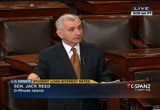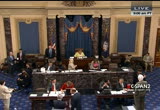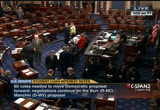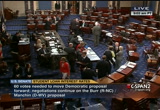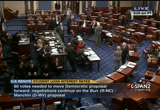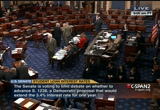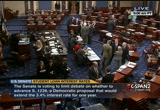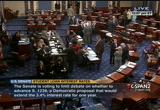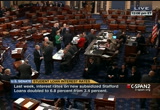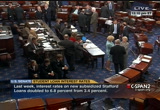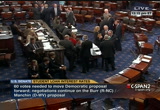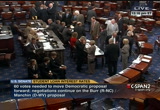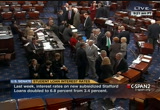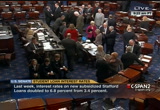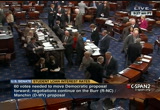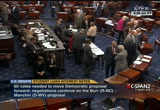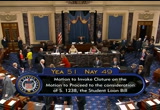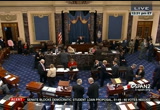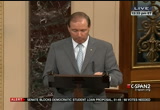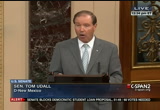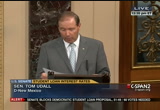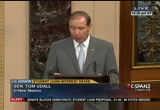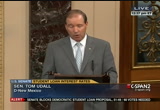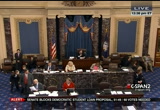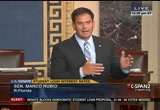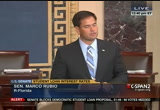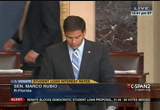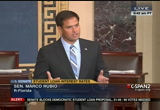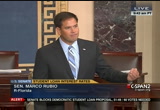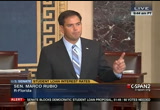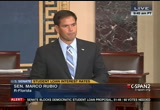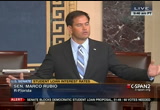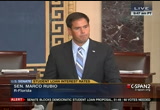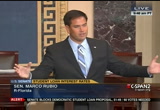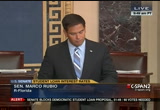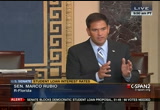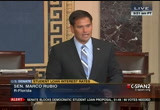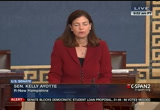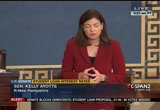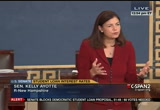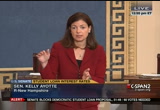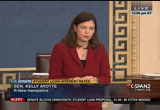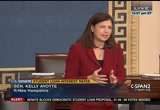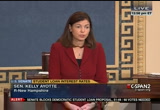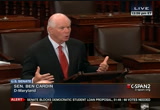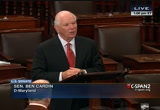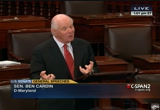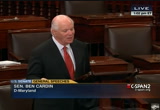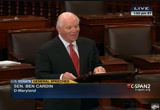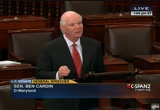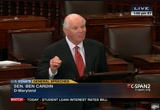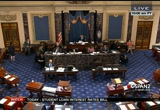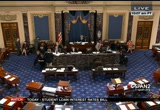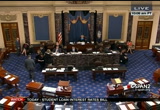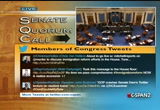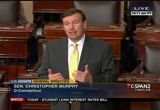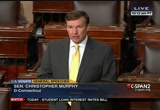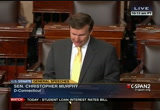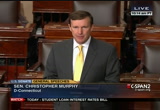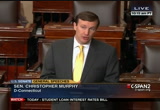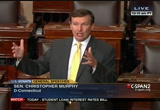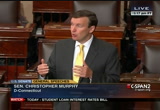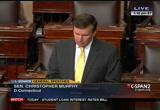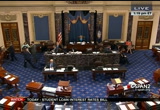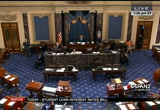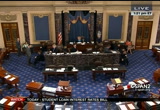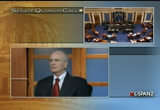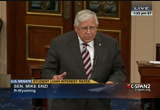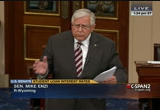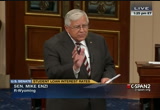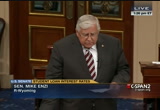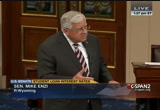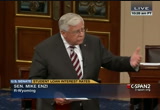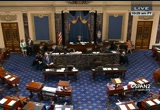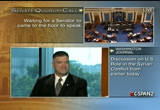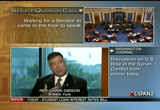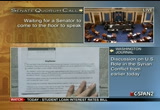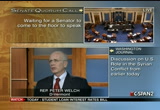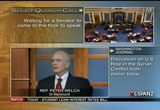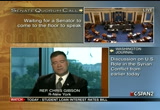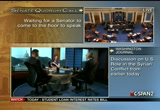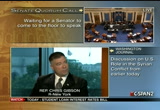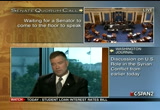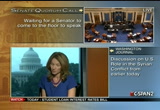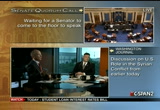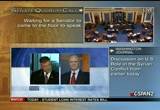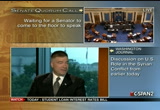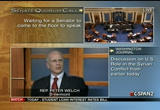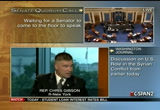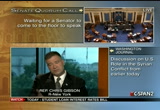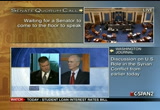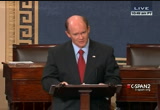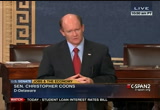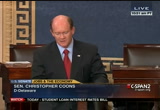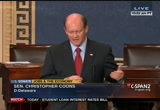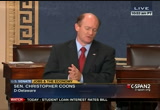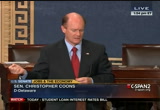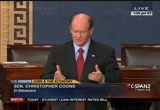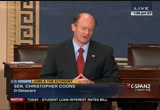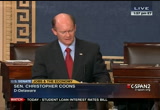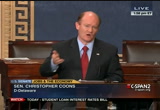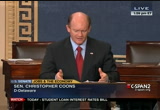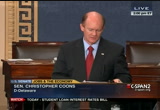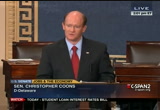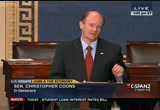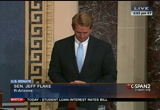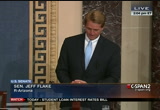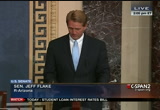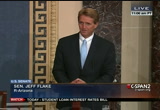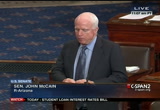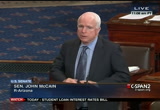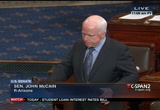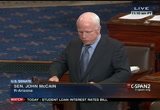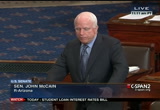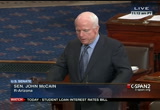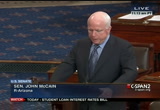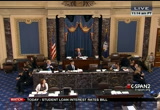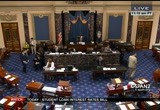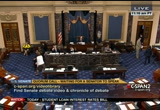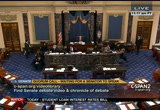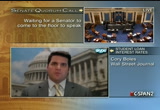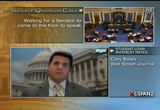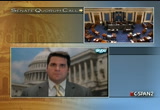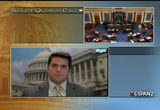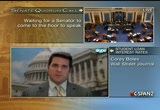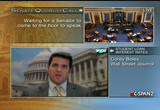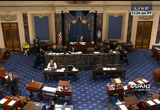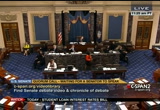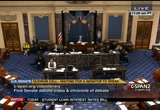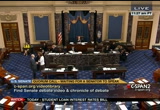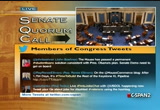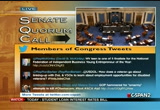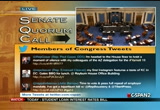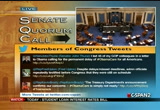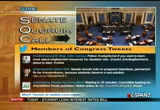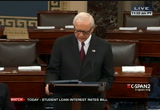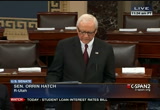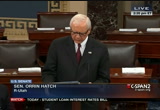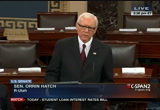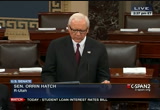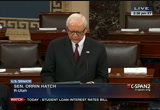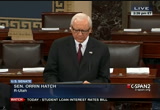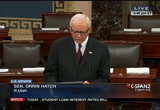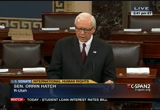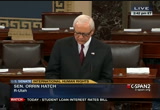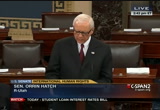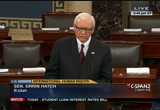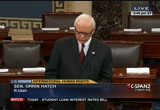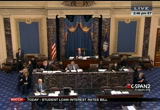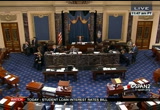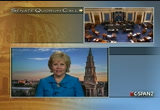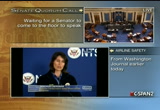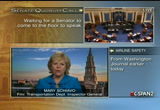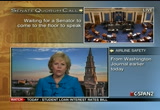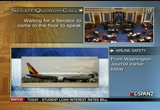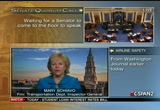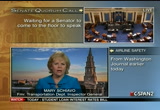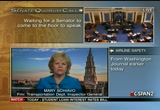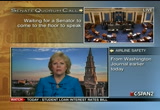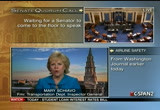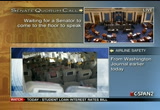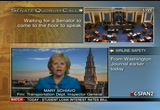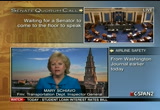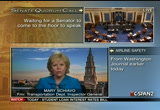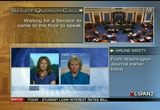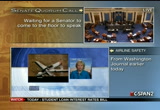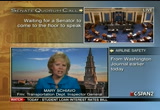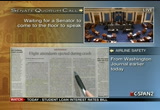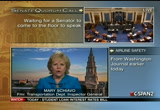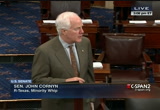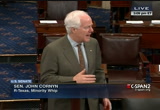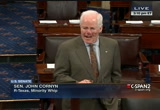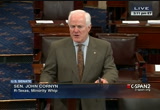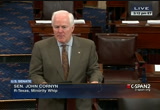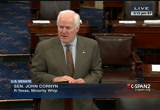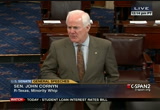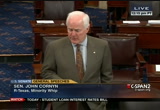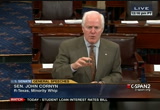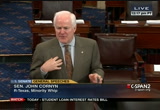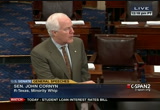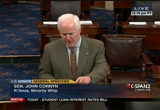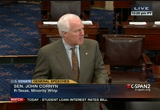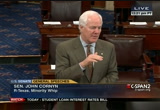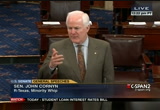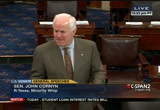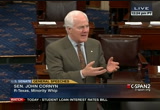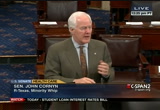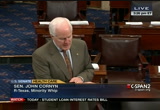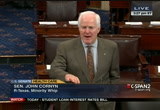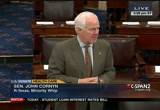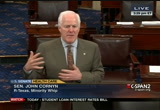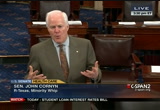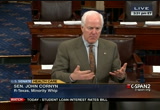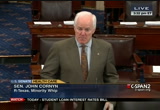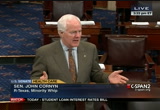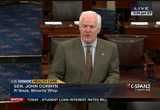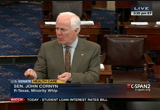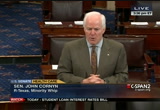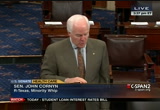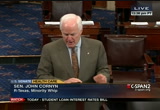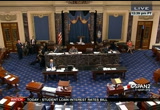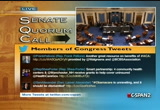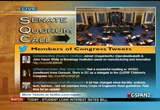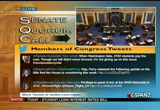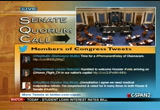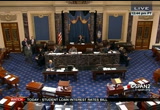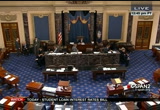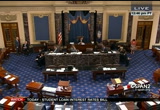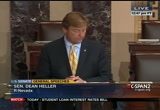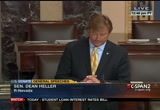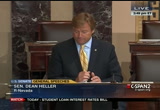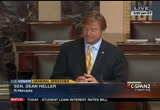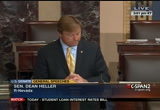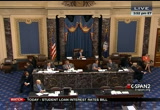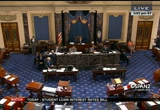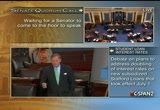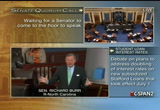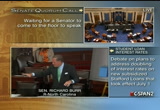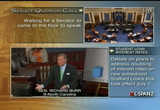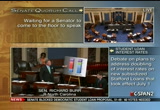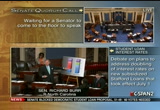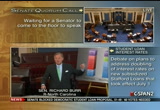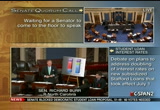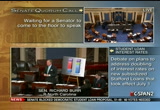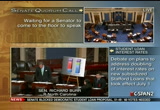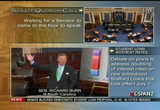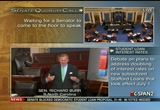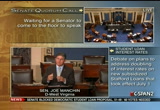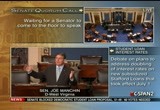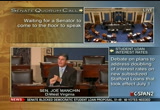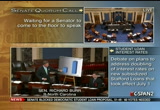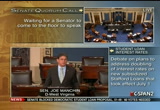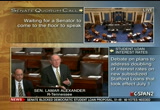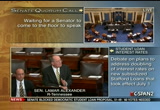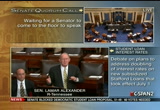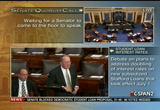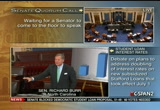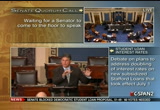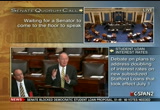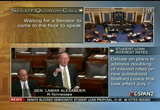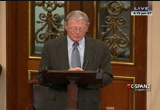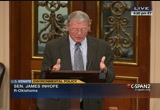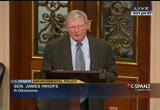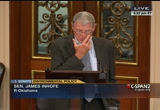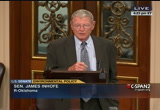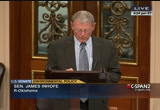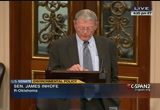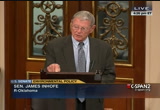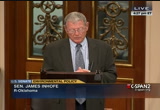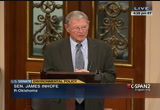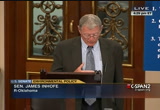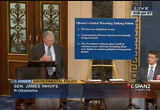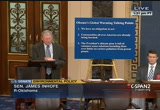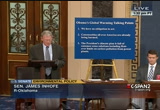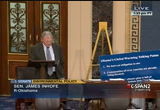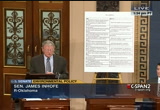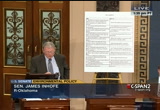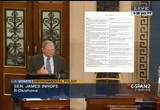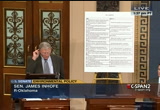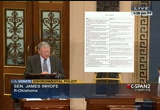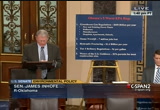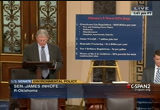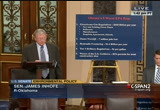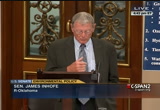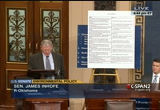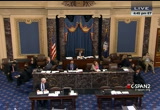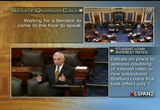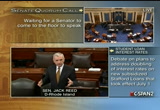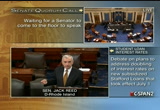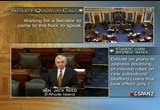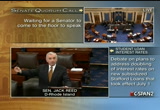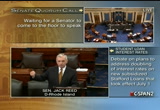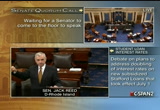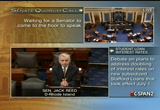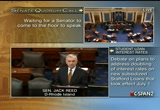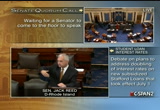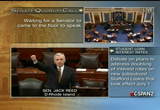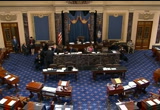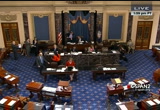tv U.S. Senate CSPAN July 10, 2013 12:00pm-5:01pm EDT
12:00 pm
we should deal with is how to we finance existing rate and the increased rate coming from proposals on the other side. i would urge all my colleagues to support tkhroer and move forward to -- support cloture and move forward to debate this bill and yield the floor. the presiding officer: the clerk will report the motion to invoke cloture. the clerk: we the undersigned senators in accordance with the provisions of rule 22 of the standing rules of the senate hereby move to bring to a close debate on the motion to proceed to calendar number number 124, s. 1238, a bill to amend the higher education act of 1965, to extend the current reduced interest rate for undergraduate federal direct stafford loans for one year, to modify required distribution rules for pension plans and for other purposes, signed by 18 senators. t the presiding officer: by unanimous consent the mandatory quorum call has been waived. the question is, is it the sense of the senate that debate on the motion to proceed to s. 1238, a bill to amend the
12:01 pm
higher education act of 1965, to extend the current reduced interest rates for undergraduate federal direct stafford loans for one year, to modify required distribution rules for pension plans and for other purposes, shall be brought to a close. the yeas and nays are mandatory under the rule. the clerk will call the roll. vote:
12:30 pm
vote: the presiding officer: are there any senators wishing to vote or wishing to change their vote? on this vote, the yeas are 51, the nays are 49. 3/5 of the senators duly chosen and sworn not having voted in the affirmative, the motion is not agreed to. mr. reid: i enter a motion to reconsider the vote by which cloture was not invoked. the presiding officer: the motion is entered. a senator: mr. president? the presiding officer: the senator from florida.
12:33 pm
a senator: mr. president? mr. president? the presiding officer: the senator from new mexico. mr. udall: thank you, mr. president. i ask to be recognized to speak --. the presiding officer: the senate is in a quorum call. mr. udall: i ask to vitiate the quorum call, mr. president. the presiding officer: without objection. mr. udall: thank you. last week, 40,000 students --. the presiding officer: the senate will be in order. the senator from new mexico. mr. udall: last week, mr. president, 40,000 students in my state got some very bad news. the rates on new stafford
12:34 pm
student loans doubled and today these students got bad news again. today, our nation's students are once again, they wait in vain for relief. these students work hard, they're ambitious, they know how important a college education is, they know what it means to their future and to our nation's future. they expected more of us and i share their disappointment. we saw this coming. this bus has been approaching a cliff for a year. that ought to be time enough to turn it around. and turn it around without throwing students underneath it. i know that many of my colleagues here are trying, trying to find a long-term solution. but today we fail and our nation's students pay the cost of that failure. for so many in my state, grants and loans make the difference. federalized subsidized stafford loans are absolutely crucial. owning a door to college, to
12:35 pm
opportunity, to investing in the future, we all know these students. most have lower incomes and fewer advantages. we ask them to work harder, and now we ask them to pay more. they are folks like laurie cole. laurie quoted in the las cruces sun news, she said i'm almost 50 years old and returned to school last year. i had to take out loans on top of my grants. i don't like the rates going up, but what can i do? i have a teen in college and a mortgage. i have no choice but to continue with my student loans. if i ever want to make more than $10 an hour. they are folks like josh dunn. josh wrote the following on his facebook page, "as a disabled combat vet, my wife and i who are both students do not have a choice but to eat the increase. i don't understand how they can continue to raise the rates on
12:36 pm
us, not only for tuition but now also the loan rate and expect the amount of students to continue to go to school. hope they can figure it out for our future." i say to josh and to so many other students like him, i hope we can figure it out, too. these students are struggling. our economy is slowly recovering. now is not the time to set up more barriers. now is not the time for interest rates to double. weighing down students, weighing down hardworking families, weighing down the middle class, the keep student loans affordable act of 2013 would have helped. keeping the interest rate at 3.4% for new stafford loans for one year. and giving congress time for a broader solution. because the problem is not just interest rates, it's the growing burden of student debt. higher education is at a tipping
12:37 pm
point, and we need a long-term plan, a plan that is sustainable, that is comprehensive. these are complicated questions. they require careful answers. but one principle should be clear: for fairness, for investing in our nation's future, college should be within the reach of all american families. not just the privileged few. students know how to set goals. they know how to set priorities. they expect the same of us. and priorities come down to choices. the keep student loans affordable act offered a choice, to help students to work towards real solutions and we could do it by simply closing a tax loophole. new tax, new debt, just closing the tax loophole, not exactly a radical notion. i will do all i can to ensure the senate will find its way to
12:38 pm
long-term answers. we will not give up on this issue. seven million students and their families are waiting. waiting for predictability, waiting for more affordable education, and control of spiraling costs. they and their families do the heavy lifting. every day, we should lend them a hand. the average college senior has over $26,000 in debt at graduation. some have much more. the burden is heavy enough. we should not be adding to it now. mr. president, i yield back. the presiding officer: the senator from florida. mr. rubio: thank you for the opportunity to speak on this issue which is clearly important to millions of americans and one that i'm too familiar with. i think i've shared this in the past personally but i'll share it again. obviously my parents didn't make
12:39 pm
ale lot of money so i would not have gone to college, would not have gone to law school had it not been for federal financial aid in the form of pell grants and loans and work study. all these programs opened that door for me. i don't think any of my siblings could have gone to college without some adennis since. the point is i know how important these programs are to americans. when i was elected to the senate? 2010 i had a student loan that was over $100,000 and i was fortunate enough as i've said this publicly, write a book which is available in paperback if anyone is interested, and with the proceeds that i made i was able to pay off that line lone. had it not been for that i'm not sure when i would have paid off my student loan for law school. it was over $100,000. early on when i had multiple loans from undergraduate grad and law school and the private loans for the bar study, there were months my loan payments were higher than anything else i was paying, at the peak about $1,400 a month.
12:40 pm
that's after making what moafs people would consider a pretty good living, it was a real load. that's at the high end of the spectrum but if you talk about the average loan debt being around $26,000, the evidence is clear this is having an impact on graduates. you graduate from college, have you the student loan debt around your neck and it prevents you from doing things like starting your life, buying a home, and in some instances if you fall behind your payments, it hurts your credit rating. the evidence continues to grow a significant percentage of young americans is facing a challenge no generation faced with this sort of student loan debt that hangs over their neck. clearly we have to figure out a permanent solution, not a one-year solution but a long-term solution on student loan rates. that's an important part of this debate. here's what i think is missing in this debate and that is an open acknowledgment what we have today in higher education as it is currently structured is becoming increasingly and
12:41 pm
inexplicably unaffordable. that's the part not being discussed here. the fundamental problem isn't the loan. the fundamental problem is the tuition rates that continue to climb across this country. according to "the wall street journal" today institutions of higher education they grew their revenue faster than inflation from 2005 to 2011 and, of course, the spending also grew. how many other marts of our economy glue spending at a pace faster than inflation over the last decade? the evidence is every time we increased the aid, that's eaten up by a higher tuition rate. in florida that was a battle we had every year. the universities said they needed higher twaition tuition to retain faculty, et cetera, to some extent i imagine that is true. but at the end of the day there comes a point especially in our public institutions where quality but also affordability have to meet. we cannot continue to price people out of higher education in this country because it's
12:42 pm
instrikably linked to our future well-being. there are two problems that face our economy. number one, we don't have an economy growing fast enough producing the kind of middle-class jobs that allow people to have the lifestyle all americans want but the other problem is we have a skills gap in america where a growing number of people not have acquired the skills they need for 21st century jobs. the only way to close that skills gap is through education and particularly higher education. what i would argue today is that the model of higher education that we have in place today largely based on 19th and 20th century models is broken. it no longer lives up to the reality of the 21st century. for example, many of the higher paying jobs in the middle class today don't require a four-year degree from a liberal arts college. they require less than two years or two-year degree program you could get at a community college. there are other things available to us in terms of how we can incentivize or are reform our
12:43 pm
higher education programs. we should look at accreditation reform. right now in order to get student loans or federal aid from the federal government you have to go to an institution that's accredited. and traditionally these are the trad traditional four-year institutions or two-year institution. but there are alternatives available, things we weren't doing a few years ago. number one, we should rely increasingly on community colleges which are a treasure in this country. the services community colleges provide students to get those two-year degrees, in fact some are in the four-year degree program and have tailored programs that allow people working to go to school and get this while they wont to work. that's an important part of the backbone. it's an extraordinary part of retraining people. you might have a job and all of a sudden that job doesn't combis anymore and you'll have to get retrained on a new skill or trade. the community colleges are an important part of that component. it goes beyond that, though. career and technical a education. i do not understand why we stigmatized that in this
12:44 pm
country, we've created the idea unless you get a four-year degree you're not successful. when we know we have a shortage of people that need -- that we need to be trained in the skills and the trades we once used to do in this country. we should get back to that and encourage that. frankly, even before the college level. why can't we graduate kids from high school with an industry certification and in a career or a grade-trade, so they're industry certified to go to work. we have examples in south florida where a car dealer every single year, a friend of mine in south florida, he actually takes high school kids and begins to train them as bmw technicians. they go to school this the morning for a couple ours hours and then to the shop and get trained. when they graduate high school they are b.m.w. certified technicians. within a year after they can get even higher levels of accreditation and start making $35,000, $40,000 a year to start out of high school. why aren't we doing more of
12:45 pm
that? instead of leaving kids trapped they feel like i'm studying stuff i don't like and doesn't speak to me, they drop out of high school, they languish in the economy 10 or 15 years and sometimes will find themselves and do a for-profit college or program to them trained. leaned allow ourselves -- let's allow ourselves to get these high school students in this country is with an opportunity to study something they love and get the skills so they can avoid that. we have this new revolution in online coursework. not every course can be taken that way but we have the ability to allow people to use the internet platforms that are available so you can take a course in political science from harvard and economics from yale. you can sit there and actually put your own course work together. this is still being developed. but this is an important part of our future innovation. the ability to bring the classroom and the learning experience to the student. not just require them to sit for
12:46 pm
lectures for an hour and a half in a classroom when they could easily get the lecture online. and it can be tailored to their schedule, to their workload, to their needs. beyond that, you see innovations in terms of giving people credit for work experience or life experience. you see colleges are doing that now where you can go in and you can say this is what i have done for the last 20 years of my life, and you get credit for that work, because you have life experience and work experience in a field. they don't just make you sit there and spend a bunch of money on electives that you are never going to use and don't really need because -- quote -- they want you to be well-rounded, end quote, but all it does is drive up the cost of your education. i don't know about you, but in the last years of my four-year degree, i was searching for electives to take because i had toffee electives. i don't -- i had to have electives. i don't even remember what some of those electives were, but i paid for them, with student loans and pell grants. i would have preferred to get the things that i needed to know
12:47 pm
so i could have moved on to law school and do it there. these are some of the ideas we have of how we should revolutionize our higher ed system. the fact of the matter is we have a challenge before us now unlike anything we have ever had. industries are now evolving on a yearly basis. most americans are going to have to be retrained at some point in their lives on a new skill because that's just the pace of change, and we need to have the infrastructure in place to provide that for people in a way that's affordable, in a way that's affordable. it reminds me of the story of a friend that i had. it was one of the parents on one of my son's teams, and the mom, you know, she was always struggling, she was always the first one to get laid off at her office. she worked primarily as a receptionist at a dental clinic, medical clinic, got a little bit into billing. but what she really needs to become and what she would like to become is an ultrasound technician, is an ultrasound technician, so she can make a little bit more money, have more job security and provide her
12:48 pm
kids with the opportunities she wants them to have. the problem that she has is she has to work eight hours during the day. how is she going to do that and then go to school and get that training? and i'm telling you, in many parts of this country, we do not have the infrastructure in place for that to happen, and our financial aid programs, both on the loan side and on the pell grant side, do not provide the flexibility for them to be able to do that in the most cost-effective way. to that end, by the way, i have proposed a number of pieces of legislation. most of them are bipartisan. i have worked with senator wyden and others on the student right no know before you go act. that basically means that before you take out these loans, you're going to be provided meaningful information on this is how much it's going to cost to go to school here, this is how much people that graduate with this degree from this college make when they graduate, and this is how much you're going to owe. you can still take the course, you can still major in that, but you deserve to know. you deserve to know that if you're going to owe $20,000 and you're only going to make $20,000 a year when you graduate with this degree, it's going to take you a long time to pay it, if ever.
12:49 pm
students have a right to know before you go. that's the student right to know before you go act. i have also offered legislation last week, the higher education and skills obtainment act, which will create one universal tax credit for higher education, and it will produce measurable savings, some of which can be redirected to the shortfalls in the pell grant program that are coming up. the bill basically offers one tax credit for students who are most in need, giving students the ability to avoid navigating a confusing maze of temporary tax provisions worth different amounts for different income thresholds. and by the way, people involved in job skill training would also have access to this universal credit, as opposed to all these different credits that are floating out there now that people don't fully understand how to use. there are other ideas that we have proposed. i have introduced legislation with senator coons that provides an innovative partnership that will create an interactive source of information for students to be able to create college savings accounts. studies have shown that american children with college savings accounts in their name are seven
12:50 pm
times more likely to go to college than students without one. this bill will combine innovative student support tools with savings accounts to promote access for low-income students in our country. they have to put some money aside to be able to do this. the fact of the matter is that today's 21st century student requires a higher education system that best suits their needs, whether that's in the form of a traditional university, a community college, a career or technical education, work force or training programs or a combination of all of these things. and i'm not saying this is not an important debate to have, because it is. it's facing people right now, but i hope at some point we will look at our student aid programs and what we can do to tailor them to the 21st century, to all of the innovations that are now available to us to allow people to gain the knowledge they need to become competitive in a 21st century economy. and that's going to require, in my opinion, a significant restructuring in how our higher education is developed. this is not a threat to liberal arts colleges or traditional
12:51 pm
four-year educations. that will always be part of our system. it's an important part of our system. but that doesn't work for everybody, not because they are not smart enough but because they have a job during the day, because they are raising three kids. if you are a single mom with three kids and a full-time job, you can't just leave all that behind and go to gainesville, florida, to the university of florida for four years. you need the ability to be able to get that degree that allows you to do it. i lived that. my sister had to do that. she went back to school in her 30's and finished her college degree and then got her master's to become a teacher, and today she is an assistant principal, all the while while raising two boys on her own. she would not have been able to do that if the only choice she had available to her was the university of florida or florida state, because you can't just move. that doesn't work for someone in that -- in that part of their lives. we need to have answers to this. and so i hope that we will spend some time focusing on what we can do in reforming the way we
12:52 pm
accredit colleges, particularly when it comes to student financial aid, and the way we structure our financial aid programs, so that the education system meets the needs of our 21st century students and not the other way around. thank you, and i yield the floor. the presiding officer: the senator from maryland. mr. cardin: madam president, i understand the senator from maine is going to go next, but i would ask unanimous consent that the time until 5:00 p.m. be equally divided and controlled between the two leaders or their designees, and that senators be permitted to speak therein for up to ten minutes each, and that any time in quorum be equally divided between the democrats and republicans. the presiding officer: without objection. the senator from new hampshire. ms. ayotte: thank you, mr. president. thank you, mr. president. i rise today to talk about an issue that we are all really very concerned about, particularly my home state of new hampshire, and that is the rising student loan rates. in fact, one study that looked
12:53 pm
at it for the class of 2011 found that from new hampshire, the average load of debt from the class of 2011 was $32,000, over $32,000. i, like the senator from florida, have experienced it flern -- personally as well. i wouldn't have been able to get a law degree or have the education that i have had without the ability to take out student loans, and only paid them off, fortunately, right as we had our first child, and so this was something that basically i used to call it i had a mortgage to pay to pay off my student loans, but i was grateful for the opportunity to get those loans and to get the education that i was able to receive, and we want to make sure that all students are able to pursue higher education in the most affordable way possible. but here's where we are today. this is such a complete typical
12:54 pm
washington deal. here we -- we just voted on a proposal on the floor, and that proposal is a one-year fix. only applies to 40% of student loans. so we would be back again next year like ground-hog day trying to fix this problem again, and it's a complete washington deal in this way. there actually has been a bipartisan proposal that has members of both parties have come together. what happened is we saw that the president put forward a proposal as to how to deal with the increase in rates on july 1. the house republicans had a proposal on how to deal with those rates. i was with secretary duncan during a hearing, and i asked him about that, and he said well, they aren't too far apart. can't we come together. and there was an opportunity for compromise, and as a result, a group of senators got together here, and i want to commend them. i want to commend senators
12:55 pm
manchin, alexander, senator burr, senator carper, senator coburn, senator king, that they sat down and came up with a permanent solution to try to make sure that student loan rates wouldn't rise where they are right now. this solution, of course, would decrease the rates for almost every student and put a cap on consolidated loans, and also most importantly not a one-year fix that we're back here again like ground-hog day, putting students and parents in a very difficult situation of not knowing how to plan, and educational institutions, everyone in the tough situation of not knowing what's going to happen and thinking that they are facing a dramatic increase in student loan rates. so i think the american people are very tired of what happens here and the gamesmanship played in washington, and here's the unfortunate thing. we had the vote of the one-year
12:56 pm
fix, and by the way, i thought "the washington post" addressed that one-year fix very well this morning in its editorial where it said that lawmakers should reject this pathetic nonsolution and put their efforts instead to finalizing a compromise plan. well, there was a compromise plan that senators from both sides of the aisle have worked on. i'm a proud cosponsor of that plan, and yet we're not being offered a vote on that plan. that's why i say this is a typical washington deal. i can understand why the american people would be very frustrateed that a bipartisan proposal that would prevent the loan rates from doubling would not receive a vote on the floor of the united states senate, a proposal where senators from both sides of the aisle have tried to take what the president wanted, take what was done by the house republicans and come
12:57 pm
up with a very reasonable agreement that is a solution that doesn't just leave us here in the same position next year, doesn't just address 40% of student loans but addresses all student loans and puts us in a situation where we would have a solution that would be bipartisan, would give students certainty, would make sure that their rates aren't doubling as they did on july 1, and yet it doesn't even receive a vote on the floor of the united states senate. that's what's wrong with washington, and i would hope that the majority leader would reconsider. he may not like the proposal, i understand, but to not give it a vote on the floor of the united states senate where it has bipartisan support is absolutely wrong, it deserves a vote, it deserves a thoughtful vote given that it has bipartisan support, and it is very close to the
12:58 pm
proposal that was put forward by the president of the united states. so i would hope we would end the gamesmanship on this important issue, that we could address it, that bipartisan proposals like the one that i just talked about would get a vote on the floor of the united states senate, and that we would resolve this issue on behalf of students making sure and parents as well who i know this is causing a lot of unnecessary consternation for them, and to not give a proposal that has bipartisan support a vote at a minimum to me seems just wrong and it's what's wrong with washington. so i hope the majority leader would at least give it the vote that it deserves, and i hope that we can come to an agreement on this important issue. thank you, mr. president. mr. cardin: mr. president? the presiding officer: the senator from maryland. mr. cardin: mr. president, i take this time to speak on the floor of the united states senate to express my
12:59 pm
disappointment in last week's district court decision on the cardin-lugar provision of the -- on the s.e.c. rule. an amendment offered by senator lugar and i on the dodd-frank legislation imposed certain transparencies on extractive industries. it was a pretty simple provision. it said that those companies that are registered on the s.e.c. that are involved in extractive -- extraction of minerals would be required to disclose on a project-by-project basis the details of those contracts. we did that for many reasons. we did it because we thought transparency is right. we did it in order to deal with energy security so that we know the type of contracts that are being entered into. we did it so investors would have information in order to decide whether they wanted to invest in the stock. the united states has been on
1:00 pm
the forefront of transparency, and this decision will delay implementation of a vital transparency rule that will shine much-needed sunlight on information designed to protect investors and to promote u.s. energy security. the cardin-lugar amendment are critical to achieving important u.s. policy objectives. these objectives include protecting united states interests in both national and energy security. why do i say that? well, by having transparency and what the extractive industries are doing, it makes it more likely that we'll have stable energy sources globally. stable energy sources are critically important to our national security interests. these provisions are important for our national security. it also ensures investors' awareness and protection. if you're going to invest in a stock of an oil company or an
1:01 pm
other mineral company, have you the right to know where they're doing business, you have the right to know what countries they're doing business, and the specific contracts that they entered into. so you can make the right decision as an investor. that's why the s.e.c. rules make sense. and lastly, it promotes american core principles of transparency, integrity, and good governance worldwide. it's interesting, we sometimes talk about the mineral wealth of a country as being a resource curse because although they have wealth, that wealth is taken by the elite of the country and used to finance corruption, adding to the misery of the people. so some of the wealthiest nations that exist as far as minerals are concerned have some of the greatest poverty in the world. well, the provision that senator lugar and i coauthored was an attempt to deal with that and to deal with good governance.
1:02 pm
if we can trace the money, we have a better chance to end corruption, develop good governance and a more stable regimes. the district court ruling of a.p.i. versus s.e.c. that sends the rule back to the s.e.c. is disappointing. the rule is flawed because the court completely misread not only the statute but the clear congressional desire of the statute. the statute provision was for transparency. and yet the s.e.c. -- the court's ruling strikes down the s.e.c. rule that implements that transparency. the court spend -- spent a tremendous amount of time addressing public disclosure of the company reports. the whole purpose of section 1404 is to provide transparency about payments made to government. why would congress write a law to increase transparency for investors and allow the s.e.c. to keep these reports secret? congress was clear this the letter and the spirit of the law
1:03 pm
that this information should be in the public domain. an the issue of the host country exception, over the very lengthy comment period for the rule of the s.e.c. was not presented with one concrete example from industry about a specific law or contract that would prohibit these types of disclosures. in fact, examples are to the contrary, including the fact that companies such as norwegian oil giant stat oil regularly reports to angola and china where industry says prohibits such disclosure yet that company co had no negative repercussions. the a.p.i. is trying to muddy the waters by having the s.e.c. address problems that the industry has failed to prove exist. the united states has been a leader on transparency in the extractive industries. and it's the district court that
1:04 pm
has now put a hurdle on that transparency. the district court -- the decision is not only contrary to the law, it's contrary to what is happening globally today. the e.u. has already enacted a law requiring the same payment disclosure that section 1504 requires on a project and company level without any -- without exceptions. and at a summit last month, the g-8 issued a communique unequivocally backing mandatory closure. canada has said it will develop mandatory disclosure in two years and the canadian mining industry endorsed that provision. despite the oil companies' fight in the u.s. court overwhelming moment sum on the side of mandatory closure disclosure. credit? because of national security, because investors have the right to know, why, because it's the right thing for good governance. despite this setback, we will
1:05 pm
not give up. this law still stands and the s.e.c. has many options to appeal the decision or revise the rule. stek must make -- the s.e.c. must make sure it finishes the job. as senator levin and senator lugar and i stated in our amicus brief in this case, resource companies can make whatever communications they wish about payments to foreign governments. the recourse curse they have done so throughout the process. what resource companies may not do is impede the power of the legislative branch to require disclosure of objective information to fulfill compelling public policy objectives. including the strengthening of america's national and energy security and investor protections. madam president, it's exactly what that provision did. congress exercised its right as the labor to -- legislative
1:06 pm
branch to require transpearns for good public reasons. members of congress on a bipartisan basis have long supported transparency through comprehensive disclosure of payments made by resource companies. that support will continue as we work with the s.e.c. to implement this important law. madam president, i would suggest the absence of a quorum. the presiding officer: the clerk will call the roll. quorum call:
1:10 pm
the presiding officer: the senator from connecticut. mr. murphy: madam president, i ask that the quorum call be dispensed with and that i be given unanimous consent to speak as if in morning business. the presiding officer: without objection. mr. murphy: thank you, madam president. i rise today to speak on the american jobs matter act, legislation introduced by myself, senator blumenthal, senator brown, and senator merkley. madam president, no one is going to disagree that this country has the greatest, most powerful military in the world and although the defense department has not been spared from the draconian cuts included in sequester, we still have a robust defense budget. annual defense spending has grown from about $287 billion in 2001 to over $700 billion today. that's hovering today around 6% of g.d.p. a significant portion of these
1:11 pm
federal defense dollars are used to purchase manufactured gdz goods that make our military the preeminent fighting force in the world. in order to have the best military you need the best people and we certainly have that. but you also need the best stuff. and we have that as well. it's not debatable that our industrial base going all the way back to the iconic assembly lines that turned out the machinery used to defeat fascism in world world war ii to today's shipyards producing our nuclear powered submarines, no one debates our industrial base isn't the best in the world. but 20 or 30 or 50 years from now are we still going to be the best? that's the question before us today. and the question that this legislation seeks to answer. over the past pief years the department of defense has cumulatively spent about $500 billion on manufactured goods and the u.s. has lost 1.7
1:12 pm
manufacturing jobs. why is that a this? obviously there is no single answer to this question but it's telling during this period of time d.o.d. has spent $124 billion purchasing goods from foreign manufacturers. some of these foreign manufacturers are in country that are our allies and alour allies, but some come from countries that aren't our allies today and are never going to be our allies. the bottom line is when we out source defense manufacturing capabilities to our allies or to our adversaries, manufacturers shut down in this country. and our capability to create and make critical defense items for our soldiers vanishes. the erosion of our industrial base kills jobs and it jeopardizes our national security. now, there are countless examples of how these spending
1:13 pm
decisions harm our industrial base but i will give you just two examples that affect my home state of connecticut. in water bury, connecticut, there is a company that makes the metal tubing that goes into every ship that the navy builds. it holds the wires and the conduits. it's an incredibly complicated product such that there are only about two or three companies in the world that make this. for over 150 years this company in waterbury, connecticut, has employed people in my state and kept our navy equipped with the tubing it needs. but over the years, the navy has started to favor a foreign competitor who, frankly, has a history in engaging in unfair trade practices to undermine its competitors. they're offering the navy a slightly discounted price than the american company so from the navy's perspective it's tempting to award that bid to an overseas contractor.
1:14 pm
but the monetary cost simply to the navy can't be the only thing that we look at. first of all, if this company in waterbury goes under, then we will forever lose the ability to make this critical defense item in the united states. now, today the country from which we're buying this might be our ally but who knows what the case will be ten or 20 years down the line and the fact is you can't just re-create the expertise and the personnel and the machinery that makes this specific type of metal tubing. but second, even if the navy gets a 5% or 10% or 15% discount on this particular item, that benefit to the navy essentially disappears when you look at the overall cost to the u.s. taxpayer. because when those jobs are lost in waterbury, connecticut, those men and women start qualifying for federal benefits like unemployment and medicaid. we lose the tax revenue that
1:15 pm
comes to the local government, the state government and the federal government. and all of a sudden that small discount that you got by going to a foreign manufacturer vanishes before your eyes. here's a second example and one that to a lot of americans will be absolutely maddening. we have a machine that makes dog tags. we don't make dog tags centrally. we have a machine that goes out into the field and makes them for soldiers. there is nothing more iconic or emblematic of the danger that soldiers put themselves in, the sacrifice that they sometimes make than the dog tag. it's historically been made by an american-built machine, but recently bids have been going to an italian company that makes a similar machine simply because the italian company's machine costs 3% less than the american machine. now, first of all, it's not acceptable that our dog tags are
1:16 pm
not american made, but second of all, that 3% difference is negligible when you compare it to all of the money lost when those jobs disappear in the united states. how can this happen? there was overwhelming bipartisan consensus when we passed something called the buy american law 75 years ago. we said that we should give preference to companies in the united states when we're buying things from the united states military, and i don't think anybody today really questions the wisdom of that act. but over the years, we have built in loophole after loophole, exception after exception into the buy america act, such that sometimes a minority of the parts of a particular thing that we're buying for the department of defense comes from american firms. now, the real-world examples that i just mentioned and many others have prompted me along with senators merkley and brown
1:17 pm
and blumenthal to introduce the american jobs matter act. here is what this legislation will do. it's pretty simple. it will require that the department of defense for the first time has to measure domestic employment as a factor in awarding a contract. it's a simple premise. in the same way that d.o.d. considers price and past performance when awarding work, they should also consider the impact on domestic employment in the award of the contract. under this bill, our largest contractors would also have to account for the expected job creation of their subcontractors, because that's where a lot of the problem is. you know, we're not buying a lot of big goods that are assembled in other countries, but the hundreds if not thousands of parts that sometimes go into a submarine or a jet engine or a tank or a humvee are often made outside of the united states. this would require the contractor to present an estimate of how many jobs throughout the supply chain are created here in the united states. under this bill, when d.o.d.
1:18 pm
gets two similar bids and one would create more american jobs than the other bid would, d.o.d. can take that into account when awarding the contract. frankly, most people that i talked to back in my home state of connecticut think this already happens. people just assume that if past performance and price are about equal, that the home team should win. but today, there is no law that allows military contractors to make that distinction. this bill would allow them for the first time to do that. retired u.s. army brigadier general john adams recently published a study about the vulnerabilities in our defense supply chain, and this report which mentioned actually specifically some of the examples that i referenced, he said this -- quote -- "the health of our manufacturing sector is inextricably intertwined with our national security, and that the united states national security is threatened by our military's growing and dangerous reliance on foreign nations for the raw
1:19 pm
materials, parts and finished products needed to defend the american people." madam president, it's time we changed that. the american jobs matter act will put our defense industrial base on a stronger footing for the future. i yield the floor, and i would suggest the absence of a quorum. the presiding officer: the clerk will call the roll. quorum call:
1:22 pm
1:23 pm
the presiding officer: without objection. mr. enzi: thank you. madam president, i want to make some comments about the vote that we just had on the floor a while ago. i think that it's time that we quit holding the students of this country hostage one year at a time. that's what the bill that just got turned down for cloture. it just kicks the can down the road a year. now, there were several democrats that voted with the republicans on that one, because they thought that it was time to stop kicking the can down the road. now, how do we stop kicking the can down the road? take a look at the republican alternative that was put up. the democrat one is going to save 40% of the students half of the interest rate for one year. 3.4% thereby their interest rate. the republican plan solves it for all students getting a loan and it solves it in perpetuity.
1:24 pm
it does it by making it 3% greater than what the federal government borrows its money at, which at the present time is 3.66%. 3.66% is not much higher than 3.44%, and it's a lot less than 6.88%. now, why do we have this raised to 6.88%? the federal government, this body and the other body and the president decided that a way we could fund health care in this country would be to raise student interest rates, take over the student loan business and then raise the rates to 6.88%. it provides money for the affordable care act. so we just had a vote without having a side by side. nobody got to vote on the 3.66% interest rate for everybody for perpetuity. but we have to vote for the
1:25 pm
3.44%, kicking the can down the road for other students. that's wrong. why didn't we get to vote on both of them? well, the republican plan would have had more votes than the democrat plan. there are people on the other side that don't want to kick the can down the road and that understand that this is a reasonable solution to the problem. take care of all the students, take care of them from now on, and -- and have a solution to it but i have got to say it's pretty clever. by bringing up this bill by itself, having it defeated on cloture, solves two problems. one, you have to blame the republicans, and number two, the money will still be there for the affordable care act. so that's keeping the money and blaming the republicans. how can it get better than that? it can get better than that if we solve it for all of the kids. all of the kids applying for
1:26 pm
loans this year. not just 40% of them. and solve it so they know exactly where the interest rate is going to be at the time that they apply, and it stays that way on their loan through the whole time that they have a loan. now, in future years, as others apply, the interest rate may be higher. it would be whatever the federal government could borrow money at, and we're not going to be able to borrow it at the low rates that we're borrowing it at now, but they would get the same break that everybody else does of just a 3% higher interest rate. now, i noticed that the majority leader changed his vote to a no, and that's so that he can bring this bill up again. why would he bring this bill up again without having the alternate bill so that people could vote for it, and i think it might pass? it's so that we can be blamed one more time. this isn't supposed to be a blame game around here. this is supposed to be finding some common ground and getting things done, and i think there is some common ground. otherwise, there wouldn't be
1:27 pm
some democrats joining the republicans on a bill that they propose, but that's not the way we need to do bills anyway. we need to have the chairman and the ranking member of the appropriate committees sit down and work out a basic bill that can then be amended on the floor, while first amended in committee. we're not going through regular process on a lot of these, and we should be. i assume that would go to the health, education and labor pension committee. maybe since it deals with the health care act, it would go to the finance committee, but in any rate there would be an appropriate committee for it to go to on both the finance committee and the health, education and labor pensions committee, and it didn't come to either of those. neither proposal came to that committee. it's time to quit making deals around here and start legislating. that's the way that things have been done in america for a couple hundred years, and it's time that we did that again. we can get solutions if it goes through the regular process, and it's time that we just quick kicking the can down the road.
1:28 pm
so i hope that we can reach a solution on this. i hope that if we vote on this one again, we get to vote on both of them again and we can see where the majority of the votes go, and slowly people are coming to realize that a solution for 100% of the students taking out loans is better than a solution for 40% of the students taking out loans, and one that goes on in perpetuity is better than one that just goes for a year. every year in july, we say to the students, your interest rate is going to go up unless we take action, and then we can show the one side or the other doesn't want to take the action. we have got to get this problem solved, and there are a lot of other things with higher education that we need to solve as well. it's time for that bill to be reauthorized and that should go through regular process as well. so i hope that we quit blaming each other and get something done on this. i personally like the long-term solution for 100% of the students instead of the 40%
1:29 pm
1:49 pm
the presiding officer: the senator from delaware is recognized. mr. coons: i ask unanimous consent to speak up to 15 minutes as if in morning business. the presiding officer: without objection. mr. coons: thank you, madam president. madam president, i rise today to talk about something that we don't hear enough about on the senate floor these days, jobs. jobs. madam president, jobs. during the 2012 election, the monthly jobs numbers were even more closely watched and analyzed than the daily polls, but ever since, it's as if congress has forgotten that there are still 12 million americans looking for work, and
1:50 pm
from my home state of delaware alone, 32,000 delawareans out of a job. sure, we're eager to hear if the unemployment numbers are nudged up or down a tenth of a percent, but maybe washington is all too willing to put the unemployed on the back burner. we're adding nearly 200,000 jobs a month now, according to the most recent jobs report, and that's certainly progress, but one of the things i found most chilling was animals that said that at this pace it will be 2017 before our nation gets close to full employment again. is that acceptable to you? that's certainly not acceptable to me. when is washington, when is congress going to get back to working on behalf of those still looking for work? the jobs numbers that are typically reported mask an even deeper, more concerning structural problem in our economy as well. almost 40% of those currently
1:51 pm
unemployed, about 4.3 million americans, are described as the long-term unemployed. these are folks who have been out of work six months or more, short-term unemployment has dropped but long-term unemployment remains persistently high and troubling. the longer a worker is unemployed, the more difficult it becomes to find a job, whether it's because there is a stigma attached to being unemployed or because their skills need to be updated or because we need something to help lift their spirits and make them successful in job interviews. across all these different reasons, in my view, we need stronger, more engaged, more agile interventions by the federal government, by state and local governments, in our economy and in support for those seeking work to help them find employment. i think we need to act swiftly on measures to improve skills training, job placement and collaboration with state and local labor agencies. the fact is the longer we wait to deal with long-term employment, the tougher it will be to help these folks get back
1:52 pm
to work. yet, many of us here in congress apparently can't or won't focus on unemployment, long-term or short term, much less on other measures to stimulate our economy. is it any wonder the american people think congress isn't even trying anymore? here in the senate, we know that while deeply challenged by filibusters and ideological fights and caucus politics, we are still managing to get big things done. it would be an overstatement to say we're making it all work, that it's easy, but thanks to a contingent of republicans and democrats here who are working in good faith together, we have been able to make some meaningful bipartisan progress. the senate passed a bipartisan farm bill that would have taken steps to modernize our nation's agriculture system, would support 16 million jobs and actually reduce the deficit by $24 billion. what a remarkable trifecta of accomplishments, supporting one
1:53 pm
of the world's most cutting edge agricultural economies, supporting significant employment and job creation and significantly cutting our deficit. what's not to love, madam president, in that farm bill? well, the house passed a series of amendments that eliminated our hard-fought bipartisan compromises and has effectively doomed the bill. similarly, the senate here passed a bipartisan water resources development act to modernize america's water infrastructure all over the country, including drinking water, waste water treatment, shipping channels. it got 83 votes here out of 100 in the senate. it's being slow walked in the house over ideological objections about the power of the government on environmental authority. after a historic committee markup, after the congressional budget office said it would reduce the deficit by $150 billion in the first decade and $700 billion in the second, this senate passed an overwhelmingly bipartisan immigration reform bill. i think one of the biggest accomplishments of this
1:54 pm
congress. this senate passed an overwhelmingly bipartisan immigration reform bill only for it to languish stubbornly in the partisan hunger games that is today's house of representatives. the headline in politico from today reads negligence reform heads for slow death. americans are frustrated with this, madam president, and so am i. the house of representatives has sadly become wholly dysfunctional, paralyzed by partisan civil war over the fundamental question of whether government should be an instrument of good in people's lives. that's the key here. sadly, the fighting within the republican party that is dividing that caucus internally. on the one hand, you have genuinely principled republican lawmakers who believe in this legislative process, who are committed to working collaboratively on the challenges our nation faces. these folks have worked with me and others and cosponsored many bills that i have introduced and others to try and make a
1:55 pm
difference here. on the other hand, you have got an antigovernment, frankly anti-obama faction that took over the house in 2010. their numbers are small but their voices are loud, and it is, i think, their core belief that congress and the federal government cannot and should not legislate. that government has no meaningful or constructive role to play in our society. i worry that that belief informs their tactics of stall and delay, investigate and repeal. the huffington post reported this week that this congress, in particular this house, has had only 15 bills signed into law so far. 15. you have to go back a long time to find a congress that has passed fewer pieces of legislation between house and senate than this one, the 113th congress. democrats and many republicans lawmakers look at this as an embarrassment. at a time of enormous challenges overseas and at home for us to take so few actions together, but the tea party and some
1:56 pm
conservative ideologues look at it as an accomplishment, who say that any compromise is a four-letter word, especially if the alternative is broad or progressive legislation. so what we have is a fight between folks who would, for example, trim the scope of funding for the federal department of education and folks who fundamentally think there shouldn't be a department of education. that's a fight in which i think the american people don't win. an opposition party is a great thing, a necessary thing for our democracy, but this opposition party within the opposition party is crippling this senate, this house, this congress. by my count, it's been 90 weeks since a republican filibuster blocked a jobs bill that was designed to keep teachers, police officers and first responders on the job. it's been 87 weeks since a filibuster blocked a bill to put americans to work through investments in infrastructure and 51 weeks since a republican filibuster blocked a bill to give tax breaks to companies
1:57 pm
that bring jobs home and end a tax deduction for companies that move jobs overseas. and frankly, just 42 weeks ago, a republican filibuster in this chamber blocked a bill to help 20,000 veterans find new jobs. in the other chamber, it's no better. the house of representatives has now voted 37 times to repeal the affordable care act. "the new york times" did the math. the house has spent 15% of its time voting to repeal so-called obamacare. in may, the congressional budget office, which is the arbiter of what is or isn't necessary, the scorekeeper, they actually said the house has voted to repeal the affordable care act so many times, it will no longer issue new scores as it attempts over and over again to achieve what seems to be its most basic purpose, to repeal. that's how much time and energy this house has wasted on this particular project that could be better invested, finding ways to implement this bill more
1:58 pm
responsibly. how much time do we waste here in this chamber, madam president, just running out the clock, waiting for 30 hours for cloture to ripen because we can't get simple agreements to move forward? i know this isn't what our side or our leadership wants. i suspect it's not what most senators of either party want, and it is certainly not what our constituents want. what should be taking days is taking weeks. what should take weeks is taking months or even years. in my view, madam president, we're not here to run out the clock. we're here to make a difference, or at least that's why our constituents sent us here. ideological obstruction has rendered this washington, this congress so ineffective, so inert, that when it comes to helping people get back to work in delaware, my colleagues, senator carper and congressman carney and i have taken an unusual action for members of congress. we have started hosting job fairs. we have used the power of the office to convene when we can't use the power of the office to
1:59 pm
legislate. we have had actually 13 job fairs up and down our state in all three of our counties in delaware and watched as hundreds of folks have come and have had the opportunity to apply for and pursue new employment. congress, in my view, should be taking a clue from that effort. we should recommit ourselves to helping our innovative small businesses grow, to helping open new markets for american goods, to helping americans find good jobs and to supporting those who haven't been quite so lucky yet. i think, madam president, we need an agenda, an agenda that focuses on five areas, where investment now will lead to new jobs, not just forted or tomorrow but long into the future. first should be education. we have to do more, as i said before, to help the long-term unemployed get professional skills to thrive in this job market, and we have to do more to prepare young people for the challenges of the modern economy. i have a bill, the american dream accounts act, cosponsored by senator rubio and others, that would help give our at-risk kids through school and into
2:00 pm
college. we should also support innovative cutting edge research, and i have got a bill that would make the r&d tax credit permanent and open it up to start-ups. it's called the start-up innovation credit act, which has been cosponsored by a wide range of senators -- enzi and rubio, blunt and moran, stabenow, kaine and schumer, a truly bipartisan bill. and i'm proud to be working with senator alexander of tennessee on hopefully strengthening and reauthorizing the american -- america competes act. a third area we should be focusing on is tied to this. we have to do more to harness the resurgence of american manufacturing. there are a dozen smart bills, many with bipartisan support, that have been introduced, taken up and passed here in the sphat that are currently languishing in the house. we should work to make a difference for america's manufacturers. fourth, we have to grow our economy by growing our markets, our opportunities around the world. as the chair of the african affairs subcommittee of the senate foreign relations committee i've worked across the
2:01 pm
aisle to push forward bills that would create new market opportunities for american businesses. with senators durbin and boozman i've introduced a bill to triple exports to africa over ten years. fifth and last, an area i thought all of us would be able to come together on is investing in infrastructure. the build act, introduced and taken up in the last congress which i hope we will move to here would create a national infrastructure financing vehicle, a infrastructure bank to help bring private funds into vital infrastructure projects. it's had bipartisan support in the past from the chamber of commerce to the afl-cio. and it is my hope that we can take it up and use it as a vehicle to help the 12 million people who are looking for work find the jobs they need. madam president, i have a simple question today. when is washington, when is congress going to get back to work on behalf of those still looking for jobs? how much longer will we wait, how much more clock will we run
2:02 pm
out, how much more time will we waste? it's my prayer that this chamber, this country finds a way to work together to get over this partisanship that has paralyzed our political process. in close, i just want to say a word of thanks to colleagues i've seen who have come and joined me in the chamber, senator mccain and senator flake of arizona, they are exemplars of the folks who have worked across the aisle to find solutions to some of the big problems facing us. they worked tirelessly with democratic colleagues to put together the architecture of the bipartisan immigration bill that was just passed through this chamber in recent weeks. it is my hope that others in the other chamber will see that spirit and take up this opportunity to take up and pass legislation to put america on a track towards growth. there's 12 million reasons for us to do that. 12 million americans looking for help getting back to work. thank you and, madam president, with that, i yield the floor.
2:03 pm
a senator: madam president? the presiding officer: the senator from arizona. mr. flake: madam president, i rise today with a heavy heart to remember 12 men, 12 grieving families and 19, i'm sorry, 19 brave men, 19 grieving families, 19 empty places in the prescott community that will never be filled. arizona and the entire nation shares in their sorrow. the loss of the members of the granite mountain hotshots and the loss to the community was both terrible and swift. we are right to ask why, why were they taken from us, why would these seemingly fearless men, these exemplars of all that is brave and good and decent in men, choose a job that causes them to run into an
2:04 pm
inferno just as everyone else is running away from it. in answering that, we get in essence of who these men are. these 19 lives of achievement and purpose, courage and discipline. from all corners of america they came together in prescott with a single goal in mind, protecting people and property. to do this, they trained relentlessly, willingly took the worst that mother nature could throw at them all to save lives and homes for their friends and their neighbors. they did so accepting the risks, embracing them, even, and in the words of the old hymn, "calm and distress, in danger bold." they did so in the name of community, americans are characterized by the world by our sense of communal spirit, civic duty and service to others. this is what makes us who we are.
2:05 pm
and those characteristics describe perfectly the 19 members of the granite mountain hotshots. they were not merely given -- they are not merely given the goodlatte tiewd and respect of the citizens of prescott, they earned it. they earned all of our admiration and respect as well. in that same communal spirit we must help the families that carry the weary load. grief is a lonely thing, but those who are grieving for a husband or for a son know that millions of us are thinking of you and praying for your hearts that they find solace and comfort. to the children of these men, carry deep inside of you the knowledge that they were as proud of you and you are of them. this band of 19 embodied the best that we have about our country. i'm honored that they were in the end arizonans. we should all be proud to live in a community and a state and a
2:06 pm
nation built on the kind of guts and selflessness that these men personify. today, we are all in the words of a.e. housman, townsmen of a stiller town. may god bless the souls of these 19 brave men. senator mccain and i had the privilege yesterday to travel out with the vice president and two cabinet cents and other members of congress to a memorial service for these brave 19. it was an incredible experience to see a community come together as it did. the townspeople, people from across the state, across the country, and people across the world sending their condolences for the actions of these men. we are so fortunate to live in a country like this. senator mccain and i are so fortunate to be arizonans and
2:07 pm
we're fortunate to witness what we have witnessed in the past couple of weeks, and, mr. president, i'm pleased to help bring this resolution to honor these men to the floor, and i yield the floor. mr. mccain: mr. president? the presiding officer: the senator from arizona. mr. mccain: mr. president, first of all, i want to thank senator the senator from delaware for his kind word about me and my friend and colleague from arizona who i believe is carrying on in the fine tradition of his predecessor, senator kyl in a spirit of bipartisanship and dedication to the people of arizona. i come to the floor today with my colleague from arizona to offer a resolution honoring the fallen heroes of the granite mountain interagency hotshot crew. yesterday senator flake and i were privileged to attend a
2:08 pm
memorial ceremony in prescott, arizona, honoring the service and sacrifice of the 19 brave men of the granite mountain hotshots who lost their lives last week battling the yarnell hill fire in yavapai county, arizona. i know i speak for all in expressing the gralt tiewd to the vice president of the united states who came all the way to arizona who give a moving and stirring and wonderful testimony to these brave arizonans and i believe it's typical of my friend for so many years, the vice president of the united states, who he and his wonderful wife would come to arizona to join us in our efforts to honor these brave men. these were not men merely worth knowing. they were men to admire. they were men to emulate if you
2:09 pm
have the courage and character to live as decently and honorably as they lived. not many of us can. but we can become better people by trying to be half as true, half as brave, half as good as they were and to make our lives to count for something more than the sum of our days. the news accounts of their lives and the testimonials to their virtues that have appeared in the days since we lost them give the rest of us a glimpse of what a blessed memorier they are to those who knew and loved them. some of them were the sons of firefighters who grew up wanting to be like dad, their hero. some leave behind wives and children. some were expecting the birth of their first child. some married their high school sweethearts. some were engaged and looking forward to being husbands and fathers.
2:10 pm
two were cousins and best friends. one rescued horses. one aspired to preach the word of god. one was a standout ball player. one dressed in a yellow rain coat when he was 6 and pretended to put out fires. some were born in arizona. some came from other places and fell right in love with the beauty and people of arizona. some were shy. others were practical jokers. they were all respected and admired. the kind of men who you just like being around. they all loved the outdoors. they were athletic and adventurous. they loved their jobs. they wanted to serve others. they wanted to make a difference. they all had a purpose greater than themselves. they were all young, so young.
2:11 pm
they were all brave, so brave. they were all loved and were loved, so loved. and they will all be missed, so terribly missed. i will forever be touched by what their families and friends have told me about them, and how much they meant to them and their communities. their stories teach us how to be better people. their loss reminds us to hold each other a little tighter, to love each other a little harder. i will always consider myself disadvantaged for not having known them. from the little i know about hope in the face of daunting challenge and the indom itable human spirit that is vital to keeping our human faith and to endure i hope i can offer some solace when i say the courage of those who we honor today is immortal. it does not perish with them.
2:12 pm
how they lived and what they did will inspire others to live courageously, purposefully, selflessly. of these qualities, we tend to see merely flashes throughout our lives. in these brave men of the granite mountain hotshots we see grand examples, sublime, shining, and unforgettable examples that will summon good men and women today and long after our time is passed to live bravely and compassionately and honorably. in a fierce and terrifying encounter with extreme danger, they stood their ground like the heroes -- the heroes they were and fought for their community. while they did not come home to the people who love them so much, and will miss them always, i firmly believe we will see them again in the
2:13 pm
better world that is to come. until then, we finally remember the humanity and heroism of these brave men, their wonderfully, unassuming, down-to-earth nature, all of their marvelous imperfections known only to their closest family and friends and how in the face of dire peril they rose beyond all that makes us merely ordinary and let god cradle them in his arms, and carry them away. the lost men of the granite mountain shotshots died having taught us all how to live and for that as we honor them and pay our respects to their loved ones today, i should submit we should all find great solace. mr. president, i ask unanimous consent the senate proceed to the consideration of s. res. 19
2:14 pm
submitted earlier today. the presiding officer: the clerk will report. the clerk: senate resolution 193, honoring the fallen heroes of the granite mountain interagency hotshot crew. the presiding officer: is there objection to proceeding to the measure? without objection the senate will so proceed. mr. mccain: mr. president, i ask unanimous consent the resolution be agreed to, the preamble be agreed to, the motion to reconsider made and laid on the table with no intervening action or debate. the presiding officer: without objection. mr. mccain: mr. president, i yield the floor. .
2:15 pm
2:33 pm
mr. hatch: i ask unanimous consent that the quorum call be dispensed with. the presiding officer: without objection. mr. hatch: mr. president, 23 years ago i stood here on the senate flr as we voted 91-6 for the conference report on the americans with disabilities act. i predicted that this landmark piece of legislation would literally unlock the resources of individuals with disabilities that had previously been wasted. i worked long and hard to get it
2:34 pm
meacted into law. -- enacted into law. it was one of the things -- one of the bills that i feel most -- most appreciative of. and in 2008 i again stood here on the floor as we passed the a.d.a. amendments act by unanimous consent. i said that it was part of our ongoing effort to expand opportunities for individuals with disabilities and to help them participate in the american dream. i remain committed to that effort. both of these legislative achievements were the result of negotiation and compromise, and they directly addressed and provided concrete solutions for problems faced by american citizens. we should address such public policy issues through the legislative process so that elected representatives make the decisions that affect americans and are consequently accountable to them. mr. president, there is under way an effort to promote the rights and opportunities of persons with disabilities through a treaty rather than
2:35 pm
through legislation. advocates of the u.n. convention on the rights of persons with disabilities or crpd appear to believe that statutes and treaties are alternative means to accomplish the same end. though i have labored with these advocates on disabilities legislation, i must respectfully but firmly disagree. my record on disability legislation speaks for itself, but i cannot support the crpd because the cost to american sovereignty and self-government clearly outweighs any concrete benefit to americans. when alexander hamilton explained the american system of representative self-government, he famously sthaid in america -- quote -- "the people govern. here they act by their immediate representatives." unquote. those words today are inscribed above an entrance to the house of representatives in the capitol, a building that thomas
2:36 pm
jefferson described as -- quote -- "dedicated to the sovereignty of the people." inquote. unquote. that includes the authority to elect representatives and the authority of those representatives to enact laws. but it is much more than that. the american people also have authority to define our culture, express our values, set our priorities, and balance the many competing interests that exist in a free society. to mut mutt itto put it simply,n people must have the last word. the crpd would compromise self-government and give the last word to the united nations. let me explain how. the crp dpvment is not a treaty with other nations. but a treaty with the in my judgment u.n. itself. -- in the united nations itself. ratifying it would create a wide range of obligations for the united states and authorize the united states -- the united
2:37 pm
nations to determine whether we are meeting those obligations. the u.n. web site says that the crpd legally binds any nation ratifying it to adhere to its principles. the treaty applies to those principles in more than two dozen areas of national life, including education, health, employment, accessibility, and independent living, as well as participation in political, public, and cultural life. article 8 even requires ratifying nations to -- quote -- "raise awareness throughout society, including at the family level, regarding persons with disabilities." unquote. the treaty also spells out what addherence to its principles in these many areas will require. ratifying nations must enact, modify, or abolish not only laws and regulations at all levels of government -- federal, state, and local -- but also social
2:38 pm
customs and cultural practices. ratifying nations must refrain from engaging in any acts or practices that are inconsistent with the treaty as well as ensure that all public authorities and institutions act in conformity with it. the heart of the crpd is a committee of 1 experts -- 18 experts elected by the nations ratifying the treaty that have -- that has authority to determine if those nations are in compliance. each nation must submit to this committee periodic, comprehensive reports on measures taken to meet the obligations imposed by the treaty. the u.n. committee dictates the content of these reports, evaluates whether a nation is in compliance, and makes whatever recommendations it so chooses. i commend the senators in an article coauthored by our former
2:39 pm
colleague jon kyl and published in the journal of foreign affairs. he explains well how international law can undermine democratic sovereignty. of this particular treaty, the crpd, he writes -- quote -- "if the treaty has a practical effect, it would be due in large part to interpretations made by foreign government officials and judges and by nongunfightal organizations -- and by nongovernmental organizations, none answerable to american voters." under the u.s. constitution, ratified treaties are the supreme law of the land. since the united states has long had the most progressive disability laws and policies in the world, we likely arelrdoingd requires, but that is not the point. and instead it highlights the real problem: ratifying the crpd would endorse an official ongoing role for the united nations in evaluating
2:40 pm
every aspect of american life. ratifying the crpd would say that the in my judgment u.n., not the american people -- that the united nations, not the american peernlings has the final say about whether the united states is meeting its obligations in many areas. and it would impose this cost to american sovereignty and self-government with no real concrete benefit to americans. ratifying the crpd will not establish a single right for a single american. it will not provide for americans with disabilities anything that american law has not or could not provide. it would not even help americans with disabilities who travel overseas because their treatment depends on the laws and policies of other countries, not ours. the crpd's combination of obligations and u.n. oversight can help move nations that have not done so on their own toward protecting the rights and promoting the opportunities of persons with disabilities.
2:41 pm
that, i take it, is the strategic purpose of the treaty. but the united states is not only far down that road, we literally blazed the trail. and i was a significant part of blazing that traivmen trail. the treaty advocates argue that the crpd's impact on american sovereignty and self-government can be minimized by the many caveats that would accompany ratification. these are commonly referred to as "reservations," "understandings," and "declarations. the legal status is unclear. the crpd states that -- quote -- "reservations incompatible with the object and purpose of the crpd shall not be permitted." inquote. a judgment reserved to the u.n. committee. no less an authority than harold coe, former state department legal advise,now sterling
2:42 pm
professor of international law at yale, has questioned whether such declarations have -- quote -- "either domestic or international legal effect." unquote. treaty advocates also emphasize that the u.n. committee will have no formal authority to interfere domestically in the united states. but, as i explained, american sovereignty and self-government are not so narrow that they can be undermined only if we literally let the united nations run our country. the u.n. and its components hardly need a treaty to opine on aspects of american life or public policy. they already do so. and we've seen it many times. it is, however, something else entirely for the united states formally to endorse the u.n.'s right to do so and subject ourselves to their evaluation. treaty advocates say that ratifying the crpd would give the united states a -- quote -- "seat at the table" -- unquote
2:43 pm
-- to promote the rights and opportunities of persons with disabilities around the world. ratifying the crpd will neither create nor is necessary to maintain america's global leadership on behalf of persons with disabilities. we had the most progressive laws in the world decades before the crpd existed. individual nations, as well as the european union, are today modeling their laws after ours, even without ratifying the treaty. the only table in this arena at which the united states doesn't already have a seat is the u.n. disability committee. but do the math. the committee has 18 members who are elected by the crpd state parties, currently 132 nations. the chances of the united states having a seat at that table at any particular time are remote. and it will get even smaller as
2:44 pm
even more nations ratify the treaty. and besides, as i just noted, advocates acknowledge that the u.n. committee has no formal authority anyway. finally, treaty advocates say that the united states ratification will encourage other nations to do so. but at least 19 nations on four continents from norway and russian federation to barbados, israel have ratified the crpd just as it was received here in the senate a little more than a year ago. i have not addressed substantive issues with the crpd as currently drafted, but i will mention just one. for more than four decades, american disability law and policy have used an objective functional definition of "disability." a disability is an impairment that substantially limits a major life activity. the crpd, however, states that -- quote -- "disability is an
2:45 pm
evolving concept." unquote. involving barriers that hinder -- quote -- "fair and effective participation on an equal basis with others." unquote. the threat to american sovereignty and self-government i have described would exist even if the crpd utilized a similar concept of disability. but at least by the crpd's terms, it appears that the u.n. committee will use an evolving concept of disability to evaluate how the united states has implemented its objective concept of disability. there exists virtually nothing that the united states could do after ratification that it could not or does not already do today. the truth is that every argument ratifying the crpd applies properly to other countries, not to the united states. the only real benefit of ratification that i can see would be to endorse the
2:46 pm
principles and policy statements in the treaty. the united states, however, either already does so by law or can do so in ways that do not undermine our sovereignty and self-government. in the end, the most potent kind of leadership is the kind that america has exercised for decades, decades already. taking real action to protect the rights and promote the opportunities of persons with disabilities. i remain as committed as ever to that ongoing responsibility. mr. president, i suggest the absence of a quorum. the presiding officer: the clerk will call the roll. quorum call:
3:08 pm
mr. cornyn: i ask that the quorum call be rescinded. the presiding officer: without objection. mr. cornyn: mr. president, what do you get when congress passes a 2,700-page piece of legislation on a purely partisan basis that radically transforms one-fifth of our economy and impacts the lives of 319 million americans? what do you get when you impose the huge cost of this legislation and this new bureaucracy that goes along with it on an economy that's just trying to recover from one of the biggest recessions our country has ever experienced back in 2008? well, two of the things you get for sure -- one is higher unemployment, fewer jobs, and the setted thin second thing yos anemic economic growth and we've seen both of those in the daily
3:09 pm
news. we now have a new normal, i am aafraid when it comes to unemployment in america, about 7.6%. but that doesn't even count the people who've quit looking for work. the bureau of labor statistics has a ranking of how they -- they rate the number of people actually looking for work. tts called the labor -- it is called the labor participation rate. it is on their web site. we have the fewest number of americans actually in the workforce that we've had in the last 30 years. and we didn't get many of the benefits that were promised when obamacare was passed, and at a time when we were essentially told we're from the government, trust us, it'll all turn out okay. one of the most important numbers in the recent job report is the number 8.2 million.
3:10 pm
that's the number of americans who are now working part-time instead of full-time, because the full-time jobs are simply not available. in other words, there are 8.2 million workers who are working part-time even though they want a full-time job, because they can't find one. just to give you some perspective, in march the number was 7.6 million, so between may and june we've seen that number increase by 300,000. 300,000 less americans able to find full-time work so they had to accept part-time work. and i know it's tempting when we talk about numbers like this to think that these are just abstractions, but these are the american people. these are moms and dads, brothers and sisters. these are young adults who are looking for work but simply can't find work on a full-time
3:11 pm
basis. and i would suggest -- and i think the evidence is compelling -- that one of the reasons for that is obamacare. the law requires all businesses with 50 or more full-time workers to provide their employees with government-approved health care coverage and if they don't, then they have to pay a penalty, a financial penalty. this requirement originally scheduled is kick in last -- next year but last week the obama administration announced that this so-called employer mandate would be delayed until 2015. in other words, the administration has implicitly acknowledged that the mandate is discouraging creation of full-time jobs and is actually reducing working hours, relega relegating many american workers -- 300,000 more between may and june -- to part-time work even though they want to work
3:12 pm
full-time. the irony is that this legislation was passed -- i still remember -- christmas eve 200 9,:00 a.m. in the morning, the obama bill was passed. was later reconciled in 2010. but we've had two elections occur before the full implementation of this bill and what we're going to see now is another moving the implementation off until after the 2014 election. that's dangerous in my view because it means there's no electoral accountability for the true impact of this legislation, even though we're beginning to see some of it. of course the basic problem is that the mandate won't magically disappear in 2015, even after it's been delayed by unilateral action of the administration. but it strikes me as pretty simple that when you penalize
3:13 pm
full-time work, what you're going to get is part-time work in order to avoid the penalty. of course, the employer mandate isn't the only part of obamacare that's hampering job creation. the law also contains a a $1 trillion in tax increases, including a new medical device tax that's already prompted several large manufacturers to close existing facilities or cancel plans for new ones. i remember a few months ago i had a medical device company that's located in texas tell me that they were going to be expanding their operations in costa rica, not texas, in order to avoid this tax. the medical device tax is also discouraged health care saving and lifesaving innovation. i mean, one of the great things about our country and our free
3:14 pm
enterprise system is that somebody has got a better way do something, they can design it, they can build it, and consumers are benefit from it. but in this case, this medical device tax has been destructive of each of those. indeed this tax has been so counterproductive that 79 members of this senate, a supermajority 0en a bipartisan basis, rejected it during the vote on the budget resolution recently and effectively said that it should be repealed. and this included a number of colleagues across the aisle that supported the legislation initially, but they've now seen that the way this has become implemented can be damaging and destructive, not just to job creation but access to quality health care. this same thing could be said of the 81 members who voted to abolish obamacare's i.r.s. 1099 reporting requirement back in
3:15 pm
2011. so the more we've learninged about the implementation of obamacare, the less popular it has become. for that matter, the administration itself has had second thoughts about key provisions of obamacare. in 2010, the department of health and human services began granting a series of waivers from obamacare's annual limit requirements, and it eventually granted more than 1,000. in other words, the administration unilaterally said to some people, you don't have to comply with the law while the rest of us were stuck with it. in 2011, health and human services secretary kathleen sebelius suspended all work on the so-called class act, a portion of the obamacare that was formally repealed earlier this year. and a few months ago, health and
3:16 pm
human services announced that obamacare's basic health program would be delayed until 2015, again, after the next midterm congressional election. and just last week, in addition to delaying the employer mandate, the administration also delayed another important provision in the obamacare oversight. in other words, it said you don't even have to prove that you are financially eligible for taxpayer subsidies to get insurance in the health exchanges. this is an invitation to fraud and abuse. we saw in 2008 when the bubble burst after the financial crisis came to a head that one of the root causes of that were companies writing loans to people who couldn't qualify for those loans, but they didn't require any financial disclosure or verification. those came to be known as liar
3:17 pm
loans. we're essentially now refusing to learn from that experience in the health care field just to see on the part of the administration, to see as many people as possible signed up for the health care exchanges. but based only on their unilateral declaration that they are eligible, not any real verification or proof. and that's an invitation to fraud. to add it all up, it's become clear that not withstanding its aspirations, not withstanding the hopes and perhaps dreams of those who thought we were going to somehow transform health care with this legislation, it's now become clear to me -- and i dare say millions of americans -- that obamacare has simply not lived up to its promises. it is not working as advertised. and i think there is a growing
3:18 pm
bipartisan consensus of that. i've mentioned some examples and some reasons why. but the past three years we've witnessed a nonstop parade of mixups, fumbles, delays and broken promises. for example, during the 2008 campaign, president obama pledged that his health care law would transform health care. it would make the health care cost for a family of four go down by $2,500. what's actually happened is that the cost of family premiums have actually gone up by nearly $2,400 between 2009 and 2012. and according to the "wall street journal," healthy consumers could see insurance rates double or even triple when they look for individual coverage under obamacare, and that will happen this fall. some of of it is the so-called
3:19 pm
age banding where young people like my two daughters, 30 and 31 years old will be forced to pay higher premiums to subsidize health care coverage for older people. there are provisions like mandatory issue. where unfortunately you find out you've got a disease and you're not covered under obamacare, you can go out and buy insurance which is not actually insurance anymore. it is like someone said it is akin until waiting until your house is on fire to buy fire insurance. that drives up the cost and it distorts the insurance market. but what we're going to see and what consumers are going to see is their health care premiums go up as a result of the implementation of obamacare. and what about the promise that obamacare wouldn't raise taxes on anyone making under $200,000 a year? in fact, the law raised taxes on everyone from young people with
3:20 pm
health savings accounts to middle-class workers with families, to senior citizens living on a fixed wage. president obama also promised that anyone who liked their existing health coverage would be able to keep it. you remember that one? if you like what you have, you can keep it. i know people like hearing that because most americans, into the 80%, maybe higher, are satisfied with the health coverage they have now. when the president said if you like what you have you can keep it. most americans nodded and said that's good. but the reality is, according to the congressional budget office, that at least seven million americans will lose their current health insurance because of obamacare. a few months ago one of my constituents in texas sent me a letter that she had received from her health care provider. the letter informed her that
3:21 pm
because of the new health care law, the so-called affordable care act, which is turning out to be more unaffordable than affordable, she was told her current health policy would be terminated by the end of the year. the letter also said -- quote -- "never have we experienced the uncertainty and immense challenges that confront the insurance industry during this time of health care reform." now, mr. president, i don't think it's sufficient for people like me or anyone else to just criticize this flawed legislation and to say, you know what? i voted against it. it's too bad it didn't work out. tough luck. that's not sufficient, and that's not doing our duty. there has to be a better way to reform our health care system, and indeed there is a better way. if we commit ourselves to five,
3:22 pm
five overarching principles. number one, we must make health care more affordable. that was the promise of obamacare, but that's not the reality. it's made health care less affordable. not more affordable. but we must commit ourselves to policies that will make health care more affordable by reining in costs and i have some ideas on how to do that that i'll mention momentarily. the second principle: individuals must have more choices in the health care market, and they must be allowed to make their own choices and select whatever options fits their individual needs. the idea of obamacare was that one size fits all, but we know one size does not fit all. different families, different individuals have different needs, and we need to restore the choices to individuals and not to the government dictating what those choices should be. number three, we must insure
3:23 pm
that all individuals, including people with preexisting conditions, have access to high-quality health insurance and to high-quality care. now this was a problem in the preexisting system that people with preexisting conditions found it hard to buy insurance, and this was one of the, i think, noble promises of obamacare. but we don't have to buy the whole package in order to fix this problem. and indeed there's many high-risk pools at the state level that if the federal government would help support those high-risk pools that people would be able to find health care coverage even if they had preexisting conditions which otherwise would make that difficult to find. principle number four, we've got to protect the doctor-patient relationship. no one wants to have the bureaucracy telling them what health care they can have and when they can have it. so we've got to protect the doctor-patient relationship. this is a trust, a bond of trust
3:24 pm
that most of us have with the individuals we entrust our health care to: our own doctor. and we've got to make sure that people are able to make health care decisions in consultation with their doctor and their family that suits their needs. and number five, this is the fifth principle for reform that i think we now need to begin the discussion about undertaking is we need to save medicare. what kind of policy reforms might these principles generate? well, for starters, i would suggest we need to equalize the tax treatment of health insurance for employers and individuals. this is something we discussed time and time again. but why do we favor through subsidies under the tax code certain types of health care coverage and discriminate against people who buy insurance in the individual market in secondly, from a policy perspective consistent with the principles i mentioned, we need
3:25 pm
to expand access to tax-free health care savings. there's a company in texas, actually it has franchises here in the northeast, whole foods. it's a great grocery store, and i had occasion a number of years ago to meet with employees. they vote every year on what their health plan should look like. and year after year after year they choose a high-deductible health insurance along with a health care savings plan so that if they really get sick they're protected by the catastrophic coverage. but otherwise they can save and budget for their ordinary health care needs using a health savings account. and one of the most am mazing things about that is people begin to take ownership, have skin in the game in terms of their health care choices and
3:26 pm
they tend to do what we do generally as consumers. they shop around. they say, okay, i've got my money. i need procedure x. i need this. where can it for the best price and best quality of service. these tax-free health savings accounts transform the health care relationship so you don't only just have some third party paying the bills. it's like getting a credit card that you never get the bill for under much of our current health care system. and so expanding tax-free health savings accounts like the employees at whole foods in austin, texas, is one great way -- one great policy that would improve our health care delivery system. third, we need to let people and businesses form risk pools in the individual market. and fourth, we need to improve price and quality transparency. there's actually been some good work done by health and human services recently to release
3:27 pm
health care expenditures for some of the most common procedures and reasons people are hospitalized. i think it's kind of eye opening because some people have found out that for the same procedure, in one instance you might see $1,000 being charged. in another you might see $5,000 for essentially the same practice or procedure. and providing transparency and indeed creating an opportunity for a market so market discipline can help normalize and bring down those costs, improving price and costs and quality transparency are very important to creating a true health care marketplace. and fifth, we've done in texas, we found ways to curb frivolous medical malpractice lawsuits which don't shut the front door to the courthouse for truly legitimate claims, but which have made health insurance or medical malpractice insurance more affordable because our civil justice system is more
3:28 pm
predictable. number six, we need to eliminate all the unnecessary government mandates that drive up insurance costs. what happens down in austin, texas, and state capitals across the country is legislatures comes together and they say you can't sell insurance in our state unless you cover x, y, and z. well, the fact is not every consumer, not every patient needs x, y, and z coverage but by those mandates they end up driving up the cost of that health insurance. and what we need to do is eliminate the unnecessary mandates that many people don't use anyway, because those just drive up costs. and we need to make -- by eliminating those mandates, we can help bring down the costs and make health care more affordable. and number seven -- this is an old suggestion but one that i think still is very important -- why is it that you can only buy health insurance in your own
3:29 pm
state? if i were to buy car insurance, i can buy it anywhere in the country. and i can, you know, companies in oklahoma or new mexico or indiana, they can compete for my business. and that gives the market an ability to hold down costs, and that gives consumers access to lower costs and better quality by allowing that competition to occur across state lines. so, mr. president, we don't need another government takeover of our health care system. when obamacare, when the wheels fall off of obamacare, or in the language of the distinguished chairman of the senate finance committee, if that train wreck of implementation that he predicted occurs, we don't need another big 2,700-page government program to substitute. we need to implement the types of reforms i talked about to give us lower costs, more accessibility, and greater fairness throughout our entire
3:30 pm
health care system. speaking of fairness and accessibility, we know the current medicaid program is broken when our most vulnerable citizens have a hard time finding a physician who will actually take a new medicaid patient. this is one of the problems many of us had with the obamacare expansion of pushing a lot of people on to medicaid which in my state is a broken program. where more than 60% of primary care physicians won't take a new medicaid patient because the reimbursement levels are about 50% of what private insurance would pay a doctor to treat a patient. and so many physicians say i can't afford to work for 50 cents on the dollar so i'm just not going to see a new medicaid patient. so what you have is a strange dichotomy where people actually have coverage under medicaid but they don't have access to health care because they can't find a
3:31 pm
doctor to take it at that price. and that actually i believe is sort of a dirty little secret about medicaid. all of us support a safety net program of health care for our most vulnerable citizens. all of us. but medicaid as currently constituted is not the answer for the reasons i mentioned. each state must have the flexibility to design a program that will actually meet the needs of their residents. what works best in new york, i guarantee doesn't work the same way in texas and vice versa. states should be appropriated a certain amount of money and i'm not suggesting it be drastically cut, which would deny the states an opportunity to provide health care in their own way, but we need to block grant these federal funds, not micromanage them and we certainly need to eliminate as many federal strings as we possibly can.
3:32 pm
and then provide he the states the flexibility to use the same amount of money to provide access to more health care for low-income people. speaking of access to physicians, this is a big problem in medicare, too,. of course, medicaid is for the economically disadvantage, medicare is for people 65 and older, but in my state only 58% of physicians will see a new medicare patient. that means 42% do not. in other words, if you live in a rural area or you live someplace where a -- physician won't take a new medicare patient, you're pretty much out of luck. this is a problem, again, about the way the federal government tries to save money in health care, not by using the discipline of the market, transparency and competition, and some of the other reforms that i mentioned, but rather than -- rather by whacking
3:33 pm
reimbursements to health care providers and the truth is if you whack reimbursement rates to medicaid providers and medicare providers as we currently do, then fewer and fewer people are actually going to be able to find a doctor who will see them even though they have the promise of coverage under medicaid or medicare. and we know, of course, the financial problems that medicare is currently suffering and the fact of the matter is -- and this is something i wish we would talk more about from the president to the halls of congress -- for every dollar that an average person puts into medicare, they take out $3. and that's why medicare in the long run is unsustainable and if we're going to keep the promise of medicare -- and we should, to future generations -- we need to fix it. when it comes to treating patients, physicians i believe
3:34 pm
know better than washington bureaucrats. and this is another reason why i support repeal of another provision of obamacare which is called the independent payment advisory board, so-called i.p. a.b. there is bipartisan support for preelg this provision in the house because it would appoint a group of 15 bureaucrats who would decide what sort of health care was going to be reimbursed under medicare and which would not. and there would be no real recourse to congress or anybody else because these people would be so-called independent payment advisory board. and it's not hard to predict what would happen if the ipab were implemented. when doctors are forced to accept lower rates, they will reduce the number of patients they see. or else they'll drop out of the medicare program altogether, or the types of treatments that people will be able to get from their doctor will be determined by the federal government's
3:35 pm
willingness to pay for it or not, rather than their true medical needs. i think we've learned the lesson in medicaid and medicare as elsewhere that price controls simply don't work. and they won't save medicare either. it's time to try a new approach that will expand individual choice. under the current model, seniors are forced into one-size-fits-all plan developed here in washington. under an alternative supported, i know, by republicans and democrats in different contexts, so-called premium support model, the federal government would pay a designated amount and people could use that money to buy their own private coverage. they could supplement it if they wanted to, if they wanted more generous coverage but that would have to come out of their pocket. but under the premium support model alternative, private
3:36 pm
plans would be allowed to compete against traditional medicare much as medicare advantage does now. and seniors can simply pick the plan that they want that suited their needs the most. if someone picks a private plan that's cheaper, then a traditional medicare, they can keep the savings and then, again, if they want a more generous coverage, they can pay the difference. how do we know this sort of approach will work? well, you don't have to take my word for it. all we have to do is looking at what's working now. one of the most successful government health care programs that i've seen since i've been here in the senate and that i will about is the medicare prescription drug coverage program. and a national survey released in october, 2012, found that nine out of ten seniors are satisfied with their medicare prescription drug plan. similar reforms could be made to
3:37 pm
other parts of medicare to help save the program. if these reforms are not made, medicare will go bankrupt. the great thing about medicare part d, the prescription drug program, it's actually come in 40% under projected costs, and it's not hard to figure out why. because when different companies compete in the marketplace for the business of seniors who qualify for medicare, well, they're going to compete, you guessed it, on price so they're going to try to provide it at a less expensive cost and compete based on quality of service. that's the great genius of our free enterprise system. and of competition. but if don't want make these reforms, medicare will go bankrupt. and that's something none of us should look forward to. so, mr. president, the reforms i've just outlined would give us a health care system with lower costs, a system with greater
3:38 pm
choice, and greater access to high-quality care. the system that upholds fundamental values such as fairness and consumer choice, and a system that will provide affordable health care for everyone. that's the kind of health care system we all want for our families, for our children and grandchildren. three years ago, congress took a swing at the health care issue, but ended up striking out. and missed an opportunity to enact necessary reforms, and we're still learning that as the implementation of obamacare continues to unfold. but the health care debate isn't over by any means. it's just beginning, in a way. by replacing obamacare with patient-centered reforms that reduce costs, improve transparency, expand access, we can make it easier for all
3:39 pm
3:47 pm
a senator: mr. president? the presiding officer: the senator from nevada. mr. heller: i ask that the quorum call be dispensed with. the presiding officer: without objection. mr. heller: i ask unanimous consent to speak as if in morning business. the presiding officer: without objection. mr. heller: thank you, mr. president. i rise today to address an issue that is troubling to me and to my constituents back in the state of nevada, to a growing number of americans across the country. i am referring, mr. president, to the tendency of those who lead government agencies to abusive their power and deprive americans of their constitutional rights. we've seen examples of this alarming trend over the last several weeks. the n.s.a. has reportedly confiscated private emails and phone records. the i.r.s. is specifically targeting conservative groups, seeking tax-exempt status. constituents have flooded my
3:48 pm
office with phone calls, emails and letters demanding to know why their government continues to encroach on the -- their liberty. they have had enough and so have i. recently, the federal court of nevada ruled that the federal government has abused its power in my home state. the court ruled in favor of a private -- of private cattle owners in nevada. ranchers came to the court because they felt the federal government was intentionally interfering with their grazing permits and their private property rights. the court found that for more than two decades, two decades, federal officials entrusted with responsibility, managing public lands, actively conspired to deprive wayne haig and his father's estate from their grazing permits and their water rights. in its decision, the court ruled, and i quote, the government had abused its discretion through a series of actions designed to strip the estate of its grazing permits
3:49 pm
and of the ability to use water rights." unquote. the court described the actions of the government officials as an abusive of executive power and said, i quote -- "shocked the conscience of the court and provided a basis for finding of irreparable harm." unquote. mr. president, there seems to be a pattern emerging here. the federal government is supposed to be entrusted with protecting fundamental rights like property rights and the rights to privacy. and yet, sadly, the american people are left wondering if their own government is living up to that public trust. the framers of the constitution believed that private property rights were sacred. the fourth -- the fifth and 14th amendments specifically prohibited the government's from depriving citizens of life, liberty or property without due process of law. and those amendments are there for a reason. as the nevada district court
3:50 pm
wrote, i quote -- "substantive due process protects individuals from arbitrary deprivation of liberty by their government." unquote. no question, the federal government has an obligation to help manage the nation's resources, just like it has the duty to keep americans safe and to enforce fairly the tax code. but these responsibilities require integrity, accountability and impartiality, and these powers cannot be used to push political or partisan agendas. in a state like nevada, which is made up of land that's 87% federally controlled and where resources like water and vegetation are scarce, the role of the government in technicalling private property rights is especially important and cannot be abused by overzealous government officials. the rights of cattle owners and ranchers to have their grazing permits honored is no less that important than any other form of
3:51 pm
property rights secured by law through permits and licensing, and the government cannot be allowed to arbitrarily target certain groups for punishment and selectively enforce the law. that kind of behavior is precisely what the framers wanted to guard against. whether it's the i.r.s. targeting groups for their political views, the n.s.a. confiscating mass amounts of private data or the federal government interfering with property rights, the american people are fed up with this laundry list of examples of the federal government blatantly disrespecting their constitutional liberties. fortunately, the federal courts remain open for americans to defend themselves against government abuse, but i think it's a tragedy for american citizens to be subjected to costly, drawnout litigation in order to make sure their liberties are secured against the very government they have entrusted to protect them. mr. president, the american
3:52 pm
people will not stand for an all-powerful government that ignores their constitutional rights. it's long past time that we end this culture of government bullying and harassment. the government derives its power from the consent of the governed. the consent depends on a fair, transparent and reasonable enforcement of the law. if we're to remain the greatest country on earth, live up to the powerful ideals that inspire our founders, that we must restore the trust of the american people in their government, and we must begin that process right away. mr. president, thank you, and i yield the floor.
3:53 pm
4:19 pm
the presiding officer: the senior senator from oklahoma is recognized. mr. inhofe: mr. president, i ask unanimous consent i be recognized as if in morning business for such time as -- the presiding officer: the jat is in a quorum call. mr. inhofe: i ask unanimous consent to dispense with the quorum call. the presiding officer: without objection, so ordered. mr. inhofe: i ask unanimous consent that i be recognized in morning business for such time as i shall consume. the presiding officer: without objection, so ordered. mr. inhofe: mr. president, two weeks ago the president gave a beautiful speech on global warming. he said that the world is coming to an end, and if we don't act it's our moral obligation to make sure our planet is safe for future generations, that it's all up to us. and to be successful, we must regulate carbon dioxide and other greenhouse gases. for more than a decade, the
4:20 pm
environmentalists have been pressuring democrats to do this and pressuring all of us to do this. and we all know why. i can remember years ago -- and this would have been back when i was in the house -- my first observation was when i looked at liberals in the house, they, i said their four preplz on which -- premises on which they base their decisions. one was -- i'm going from memory. this was many years ago. one was the cold war is over. we no longer need defense. another one was that deficit spending is not bad public policy. a third one, punishment is not a deterrent to crime. and the fourth one -- and this is a big one -- is that government can run our lives better than people can. and that's exactly what we're talking about here. the reason they have been wanting to do this with regulating carbon, i think, is better articulated by a guy that i don't think anyone will argue
4:21 pm
could be the most knowledgeable scientist in america. his name is richard lindsen with m.i.t.. his quote was that regulating carbon is a bureaucrat's dream. if you regulate carbon, you regulate life. you control life. that's what bureaucrats want to do. that's what the environmentalists want to do in controlling our lives. they want to determine what cars we drive, what kind of houses we live in, how our cities are built, and all of that. and they can do all of this by regulating carbon dioxide. and democrats particularly in the senate have been unsuccessful in passing legislation to accomplish this. this is the key. it was way back during the kyoto convention. that was during the carter -- the clinton administration, when al gore came back and he said we need to pass, ratify the kyoto convention. the kyoto convention would do exactly that. it would allow us in this
4:22 pm
country and around the world to regulate carbon emissions. if they do this, they're able to control the lives -- this was way back 13 years ago that this was taking place. anyway, they started trying to pass legislation. the first bill, the first one actually was not necessarily a democrat bill. it was mccain-lieberman, and it was one that was a cap and trade bill. quite frankly, at that time we were, the republicans were a majority. i chaired a committee called the environment and public works, and so i was on the floor managing the opposition to that particular cap and trade bill. that was a carbon control bill. and we won. and the years went by and we continued to win over and over again. so i guess what i'm saying is the reason the president is doing this right now is because he can't get it done by anyone who is accountable to the people. he can't get it done through legislation. so he's trying to do it through regulation.
4:23 pm
the most recent one was in 2009, the waxman-markey cap-and-trade bill. by the way, i congratulate senator markey for winning that election. it's going to be fun for us because we debated each other on this issue now for years and years. now we're in the same chamber. but the bottom line was in 2009 they did pass that. then the democratic-controlled house, and it kaoeufrpl, and of course -- and it came over and was not of course considered in the senate. it would have regulated only the largest emitters. this is the hardest thing to get across to people because everyone understands after 12 years of repetition and listening to me at this podium say it over and over again that if we were to pass any kind of cap and trade, the cost to the american people would be somewhere between $300 billion and $400 billion a year. the reason i say that, the wharton school came out and came up with a figure around $350
4:24 pm
billion. m.i.t. came out with a figure about the same. no one debated that for ten years. the cost of regulating threw cap and trade -- regulating through cap and trade would have been somewhere around $300 billion to $400 billion. now, as onerous as i think all these bills were trying to do this by legislation, it wouldn't have been nearly as bad as what's happening today for this reason. it gets into the weeds here, but it's important that we in this body understand what this is all about, because the bills that we kill that would have cost $400 billion a year would have regulated only the largest emitters, those emitters that emitted 25,000 tons of co2 a year. and it would have cost the economy $400 billion. now, we rejected it, and we all know that's what the cost -- but because the president owes this environmental base and he can't
4:25 pm
pass any legislation, he's now taking unilaterally regulatory action to regulate greenhouse gases and carbon dioxide. keep in mind this is not one of the bills that was, that we had defeated, because that would have only caused the emission control on those entities that emitted 25,000 tons of co2 or more in a period of a year. but if it's done by regulation, it has to be done under the clean air act. the significance of this is this would not just go after the big emitters. it wouldn't go after just the big, those who emitted 25,000 tons a year. it would catch people and individuals and organizations that emitted 250 tons. that's 250 tons as opposed to 25,000 tons. that means -- that would apply not just to large emitters like power plants, but every
4:26 pm
refinery, oil and gas well, every manufacturing facility, every plastics plant, the iron smelters, steel mills, every apartment building, churches, every school. so that's everybody. and so one thing that's never been calculated is what the cost of that would be. because if the cost of just those emitting 25,000 tons would be $400 billion a year, then how much would it be if you apply that to everybody all the way down to 250 tons? i do something in oklahoma each year. i get the total number of people who file federal tax returns, and i kind of do the math. so i'll take the amount of a tax increase -- in this case let's use $400 billion a year. i say how much will this cost the average family in my state of oklahoma that files a tax return. and it works out $3,000 a year. so we're talking about a major tax -- by far, the largest tax
4:27 pm
increase that this country has ever seen. so don't let the president fool you into believing that he'll stop at the power plants. he is an all-out war against fossil fuels. legally, if he goes down this path, he will not be able to stop just at the large ones. this will apply to everybody out there under the clean air act, and that would be those emitting 250 tons. and he's doing it unilaterally just for the united states. if you believe the man is causing global warming -- i don't, but if you believe that, you should be concerned about worldwide emissions. who cares, it's not just what's happening in the united states of america. it's all over the world, if there is a problem, where the problem would be. if all we do is lower our emissions without convincing china, mexico, india and other countries to do the same, american manufacturers out seeking the energy to run their operations would have to leave the united states and go to
4:28 pm
those other countries where they don't have regulations. so it would have the effect actually of increasing, not decreasing, emissions. i remember when lisa jackson was the director of the e.p.a.. she was my favorite liberal. i had three favorite liberals. she is one of the three of them. i liked her because even though i disagreed with her philosophically she was always honest with me. i'd ask her a question, and she would answer. i remember when i asked her the question live on tv in a hearing, i said, you know, if we were to pass any of these, this legislation that would regulate co2 levels, would this reduce the -- would this reduce the emissions worldwide? she said no because this only affects the united states. it would not affect the other countries. so, you won't hear the president talking about this. you won't hear him talking about the cost, even though they will shrink from our economy by more
4:29 pm
than $400 billion a year, we know that, no one refutes that, it would require the e.p.a. to hire an additional 250,000 employees, spend an additional $21 billion to implement the regulatory regime. and these are not my figures. these are the e.p.a.'s figures. and you won't hear him talking about it because he knows it's a losing argument. in fact, the day before the president gave his speech, he had his campaign send out talking points to all of the activists that he has working in his behalf. they told them exactly -- they meaning the white house -- told these people exactly what to talk about and what po to* say and -- what to say and exactly whatnot to say. we recovered this. they found this is the talking points that the president sent out to people so america would be, this is what they would be listening to. i think it is worthwhile for us to go over this right now. on this first chart, you have his overarching three-point strategy. point number one is we have an
4:30 pm
obligation to act. the memo continues, we have a moral obligation to future generations to leave them a planet that's not pollute and damaged by carbon pollution. now, notice they're not talking about climate change anymore. they're not talking about global warming. the new word that they're using now is carbon pollution. all the same thing, but global warming didn't work, so they discontinued that. they tried climate change, that didn't work. now the new word, you'll probably hear it for awhile until it is replaced. it is called carbon pollution. they are talking points. this kind of wordsmithing is kind of smart, i compliment them on going to professionals and see what kind of words they can use to make the public believe something that isn't true. the second thing that they have, that they charge would be the communities all over america are already being harmed. the memo continues, and i'm quoting now from the memo, "
4:31 pm
climate change is already harming americans all over the country, cleaning up after climate-driven disasters last year cost the average taxpayer over $1,100 or the -- or cost the taxpayers nearly $100 billion, one of the largest nondefense discretionary spendingary budget items since 2012." these are the words coming from the white house for people to use in their talking points. these figures come from the total cost of all natural disasters. i'm from oklahoma. i think we all know that we have tornadoes in oklahoma. and we've had toarnldz as long as i've been -- the years i've been living in oklahoma, all my life. and, of course, that has nothing to do -- he's talking about that figure on all natural disasters. that has nothing to do with carbon whatsoever. and it doesn't make any sense to attribute every single natural disaster and its total cost to global warming or carbon pollution as the president now
4:32 pm
says even if you believe global warming is true. so the president -- the third point the president's talking points were to the presidents' climate plan -- this is what the president is telling his followers in this body and elsewhere to do -- the president's climate plan is full of commonsense solutions, including first-ever limits on carbon pollution from power plants. the memo continues, that's why we applaud president obama's -- this is what -- what obama wants to us say about him, why we applaud president obama's climate plan which is full of commonsense solutions starting with his call for the e.p.a. to limit the carbon pollution from powrn plants while -- power plants while we set limits for -- while we set limits for arsenic, mercury and lead, we let power plants release as much carbon pollution as they want. it's time to set a limit on pollution that affects public health and that's why it's so
4:33 pm
important that the president is rising to this challenge. those are his talking points. he wants people to say about his speech and about his program. now, what this demonstrates to me is that the president is no longer fighting greenhouse gases which he says cause gloarnlg but is -- global warming but is instead fighting against carbon pollution. if carbon pollution is simply carbon dioxide or co2 and is dangerous to our health what are we going to do about the air we breathe? don't we emit co2 every time we exhale? is this the pollution they're dog about. the president's alarmists are given a concrete list of things to talk about and things not to talk about. this is something that we received just a few hours ago and we're very pleased to be able to get a copy of it. this was only supposed to go to
4:34 pm
alarmists. alarmists for the benefit of my colleagues, are people who believe the world is coming to an end and it's all man's fault. what to do and what not to do. just look at this. that's amazing on what you can say and what you can't say. we'll highlight just a few. the first point is the instruction to not talk about the cost of regulations. the memo says -- you can read it right there, this came from the bhows whitehouse -- don't lead with straight economic arguments. why? because global warming legislation will cost between $300 billion and $400 billion a year and the regulations will cost much, much more than that. carlos rivers associates. i think that's a credible group that no one has challenged to my knowledge their credibility since they've been in existence. in their study of the waxman-markey bill reported that the policies would cost the economy $350 billion a year in 2030 and $730 billion a year in
4:35 pm
2050. again, we go back to the figures that's consistent what the wharton school ten years before and m.i.t. came out with. the heritage foundation, they said that the average family would see its direct energy cost rise by over $24,000 in the first 20 years following the bill's enactment. this is the heritage foundation. saying how it's going to affect every family, the average family in america. the cost will be far higher under the president's unilateral regulatory actions that are bypassing congress because they're talking about regulating down to a much loarp emissions level. the memo instructs -- this memo right here that came out to the alarmists to use to support the president -- the memo also instructs the president's alarmists to talk about his actions being -- quote -- "the latest in a series of steady and responsible steps the administration has taken"-- unquote to combat global
4:36 pm
warming. in that vein however the memo instructs them to not overstate the magnitude of the action being taken. in other words, the president does not want his people talking about this first -- this being the first of many steps to -- in regulating every refinery, manufacturer, oil and gas well, steel mill, plastics and all of this. he doesn't want them to talk about that. the next memo instructs alarmists to -- quote -- "discuss the impacts carbon pollution is bad for the health of our kids and our planet but do not debate the validity of the consensus of the science that has already been settled." in other words, don't debate the science. just say it's been settled because we have more and more and more people now questioning the science and it's far from being settled. so they don't want to bring that up. they don't want people talking about that. well, the science is far from settled and since when does carbon dioxide which we all breathe every day hurt our kids?
4:37 pm
the memo instructs alarmists to -- this is a quote from his memo, you're looking at it here -- "inform audiences about the nature of the problem, who is at fault and what can be done. but do not debate the increase in electricity prices, instead pivot to health and clean air messages." don't admit the truth. that is over -- overactive unilateral regulation will do nothing more than increase electricity prices and unilaterally sut shut down our economy by imposing e.p.a. regulations on every industry and dramatically expand the federal government's role in our lives. this is all instructions coming from the white house. without doing anything to reduce global emissions. this is why i've got goth to repeat this at this time. if we do all this stuff, if it were done by legislation or by regulation, we know that it's
4:38 pm
not -- we've already shown clearly it will not reduce co2 emissions even if that were your goal if you wanted to do it because that's what the administrative strair, obama's administrator of the e.p.a. said. in answer to the question is this going to reduce co2 emissions, no, it won't. i've already covered that. and also that this richard lindzen and other scientists have talked about this is the bureaucrats' dream if you control carbon, you control life. keep that in mind. all this effort is being made and we have made it very clear it's not going to accomplish anything that they want to accomplish in terms of reducing co2 emissions worldwide. the last thing i'll mention from the memo is it says to -- quote -- "discuss modernizing and retooling power plants and innovation that will create green jobs but do not, quote, try to suggest net job increases." in other words, don't mention this is going to shut down every
4:39 pm
coal, oil, and natural gas power plant that we have in this country and kill thousands of jobs and manufacturers around the nation. we don't want to talk about the job loss. the president only wants to talk about the benefits of his regulatory actions and not about the costs. but what we have to remember is that even the benefits are false and overstated because they do not rely on the true cost of the regulations but we should not be surprised this coming from the administration that thinks that more regulations means more jobs. these are talking points, but the mechanics of these new and future e.p.a. greenhouse gas rules will be done by the e.p.a. gene mccarthy right now, it's the reason i'm here today is to first of all demonstrate the streech that he made and how that relates now to the current e.p.a. and perhaps the confirmation hearing that -- confirmation vote that will be coming up, gina mccarthy is
4:40 pm
being considered to take the top job at the agency and remember i said that lisa jackson had that job before and how much i thought of her. i like gina. i like her very much. i've worked with her. she has had a different job for several years and that is she was the assistant director of the e.p.a. for air issues. but that's the reason, it's very important that people understand what we're looking at. we have a good personal relationship but she's one of the -- the one who is responsible for all of the worst regulations that have come from teep in the last four years under lisa jackson's leadership. lisa jackson was director. but -- and gina mccarthy was the air director p. it's from the air office, the assistant administration for air, where she has the most expertise. and that all of the worst regulations will come in the future. after president obama's speech on global warming it became clear that gina mccarthy will be used as the tool of the administration for all of these
4:41 pm
regulations that will destroy the american economy. in the last four years, in the last four years we've had utility mact -- i've listed these up here. it's really worth looking at. utility mact, mact means the maximum achievable control technology. what technology is out there to control the emissions. so utility mact would cost the -- she was able to get that through, $100 billion, 1.65 -- 1.65 million jobs lost. the next is boiler mact, that's $63.3 billion and 800,000 jobs lost, regional, another regulation regulating the air will increase the cost of oklahoma's electricity bills by over $1.8 billion, these are all figures that are incontrovertible, people don't disagree with them them. in the next few years even worse regulations are likely to come
4:42 pm
out. greenhouse gas regulations may be the worst but others are listed here. you have the greenhouse gas, the one we've been talking about but you also have the ozone regulations, the adjustments to that hall ruhle could put 2800 counties out of attainment including all of them in oklahoma. we have 77 counties in my state of oklahoma. i can remember when i was mayor of tulsa they came out with new regulations that put tulsa county out of attainment. when you're out of attainment, that means you kiss any energy development, new manufacturing opportunity or business expansion goodbye. the don't be able to get a permit from the e.p.a. gina mccarthy is in the face of president obama's overregulatory agenda that is threatening our energy independence and putting our economic future in peril. qeent allow these regulations to move forward and i think the key to that is the person who is
4:43 pm
responsible for all the regulations, all the costs, all the jobs that i justen numerated during -- even numerated during her tenure as air boss of the e.p.a. and these in the future, that would be her goal, she would be the tool that is used by the administration. and we know that yesterday, yesterday was kind of interesting because heather ziko, she had carol browner's job as the czar -- what kind of czar was she? climate change czar. and she was on the hill huddling in a secret meeting with some of the chief alarmists like barbara boxer and the rest, i have the list but won't bother. in the meeting they talked about the president's plan and presumably this memo with wordsmithing talking points from the memo we talked about before. so the one that we had up before
4:44 pm
is the same thing that they talked about yesterday. this is how you'll have to word all this stuff. their goal is not to protect the american people. it is to control them. they want a top-down control and carbon dioxide regulations will give this to them. and there are talking points memo proves that they are doing all they can to craft their message in a way that convinces americans that they are not trying to crush our economy but instead trying to help. but the truth is their regulatory agenda will only cause more unemployment, lower economic growth, and lower take-home pay for the american people. you know, president obama delivered a beautiful speech, be global warming, that's how i started this talk and it was beautiful buferl. it was well thought out, and he is very differented. he had a beautiful speech and he's embarking on the most devastating surge in regulation that will cost hardworking americans millions of jobs in
4:45 pm
tax increases. put the chart up again on the cost there. yeah. of the tax increases to accomplish nothing. keep in mind if you do all these things it's not going to lower co2 emissions. that is proved and no one has denied it and that even came from the administrator of the e.p.a. and it's going to be devastating to the american people. and so this is a big thing. it has a lot to do with the confirmation hearing of a very fine lady that has been a good friend of mine for a long time, but the one that is responsible for these air regulations that are killing jobs in america, and we can't let that happen. i yield the floor and suggest the absence of a quorum. the presiding officer: the clerk will call the roll. quorum call:
4:58 pm
a senator: mr. president? the presiding officer: the senior senator from connecticut is recognized. mr. blumenthal: thank you, mr. president. i ask that the quorum call be lifted. the presiding officer: without objection, so ordered. mr. blumenthal: thank you, mr. president. mr. president, i ask unanimous consent that the controlled time be extended until 7:00 p.m. and
4:59 pm
112 Views
IN COLLECTIONS
CSPAN2 Television Archive
Television Archive  Television Archive News Search Service
Television Archive News Search Service 
Uploaded by TV Archive on

 Live Music Archive
Live Music Archive Librivox Free Audio
Librivox Free Audio Metropolitan Museum
Metropolitan Museum Cleveland Museum of Art
Cleveland Museum of Art Internet Arcade
Internet Arcade Console Living Room
Console Living Room Books to Borrow
Books to Borrow Open Library
Open Library TV News
TV News Understanding 9/11
Understanding 9/11